Impact of Environmental Regimes on Global Environmental Governance
VerifiedAdded on 2023/03/17
|29
|7838
|47
AI Summary
This study evaluates the impact of environmental regimes on global environmental governance (GEG). It explores the need for regimes, their relationship with GEG, issues faced by environmental agencies, and recommended activities for overcoming challenges.
Contribute Materials
Your contribution can guide someone’s learning journey. Share your
documents today.
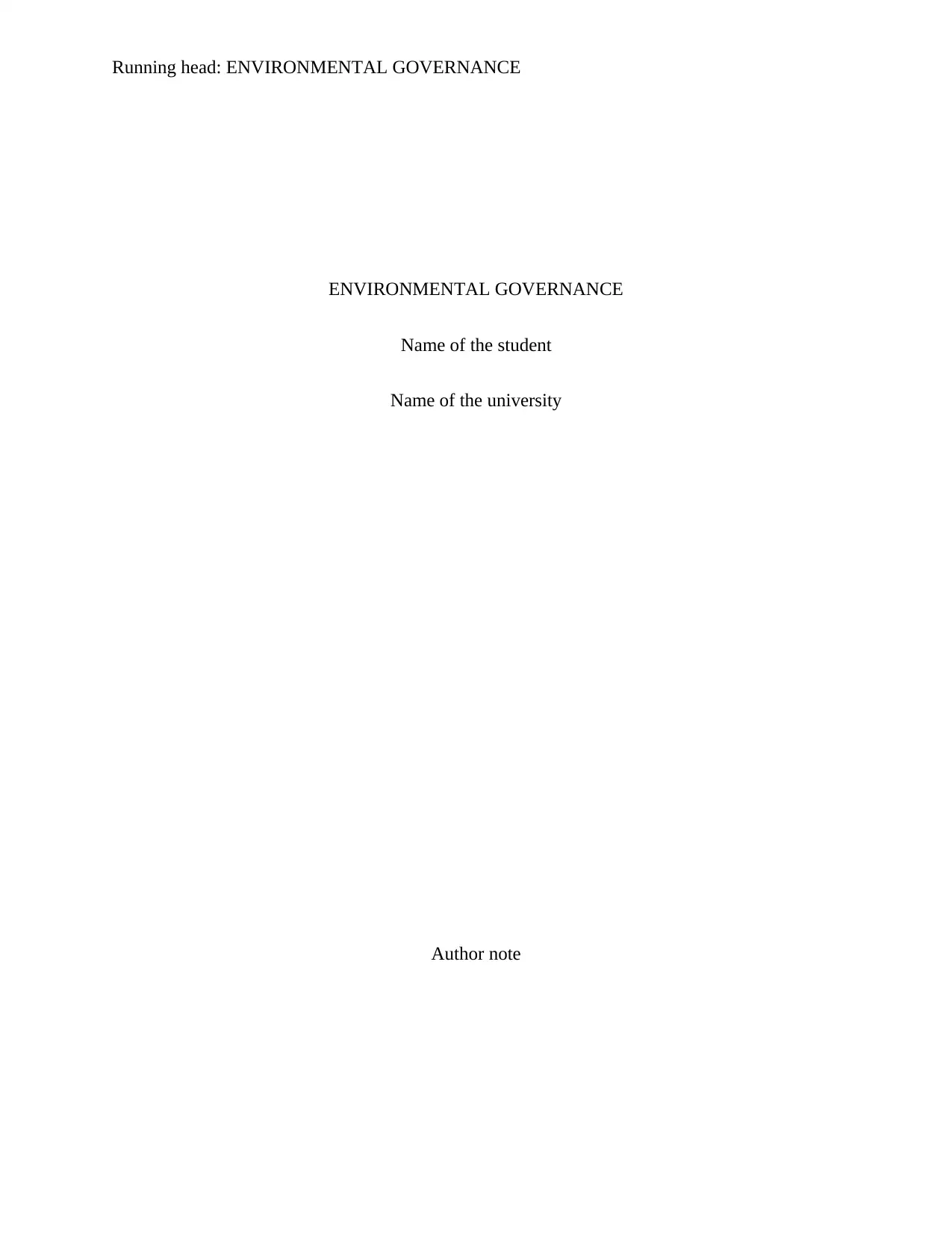
Running head: ENVIRONMENTAL GOVERNANCE
ENVIRONMENTAL GOVERNANCE
Name of the student
Name of the university
Author note
ENVIRONMENTAL GOVERNANCE
Name of the student
Name of the university
Author note
Secure Best Marks with AI Grader
Need help grading? Try our AI Grader for instant feedback on your assignments.
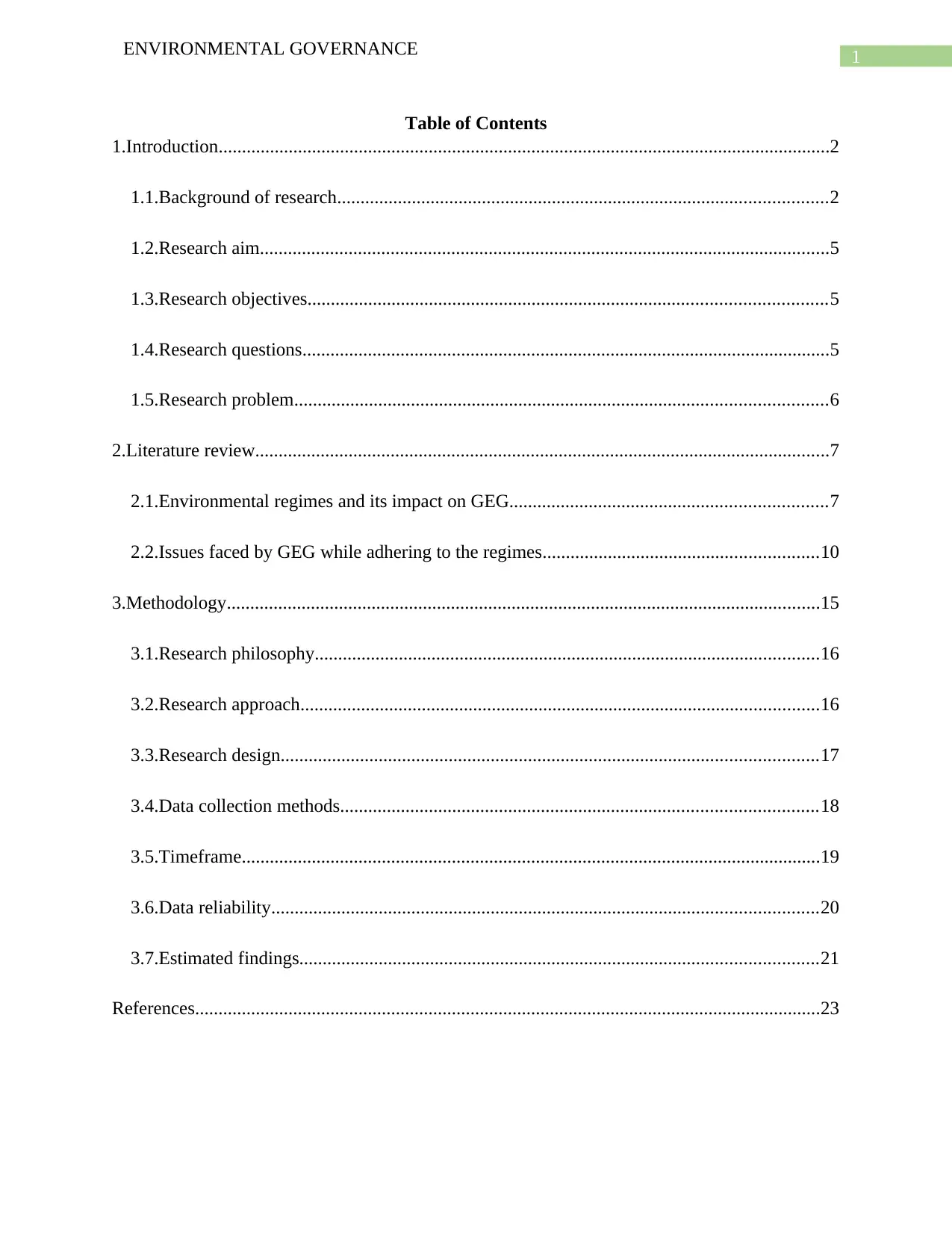
1ENVIRONMENTAL GOVERNANCE
Table of Contents
1.Introduction...................................................................................................................................2
1.1.Background of research.........................................................................................................2
1.2.Research aim..........................................................................................................................5
1.3.Research objectives...............................................................................................................5
1.4.Research questions.................................................................................................................5
1.5.Research problem..................................................................................................................6
2.Literature review...........................................................................................................................7
2.1.Environmental regimes and its impact on GEG....................................................................7
2.2.Issues faced by GEG while adhering to the regimes...........................................................10
3.Methodology...............................................................................................................................15
3.1.Research philosophy............................................................................................................16
3.2.Research approach...............................................................................................................16
3.3.Research design...................................................................................................................17
3.4.Data collection methods......................................................................................................18
3.5.Timeframe............................................................................................................................19
3.6.Data reliability.....................................................................................................................20
3.7.Estimated findings...............................................................................................................21
References......................................................................................................................................23
Table of Contents
1.Introduction...................................................................................................................................2
1.1.Background of research.........................................................................................................2
1.2.Research aim..........................................................................................................................5
1.3.Research objectives...............................................................................................................5
1.4.Research questions.................................................................................................................5
1.5.Research problem..................................................................................................................6
2.Literature review...........................................................................................................................7
2.1.Environmental regimes and its impact on GEG....................................................................7
2.2.Issues faced by GEG while adhering to the regimes...........................................................10
3.Methodology...............................................................................................................................15
3.1.Research philosophy............................................................................................................16
3.2.Research approach...............................................................................................................16
3.3.Research design...................................................................................................................17
3.4.Data collection methods......................................................................................................18
3.5.Timeframe............................................................................................................................19
3.6.Data reliability.....................................................................................................................20
3.7.Estimated findings...............................................................................................................21
References......................................................................................................................................23
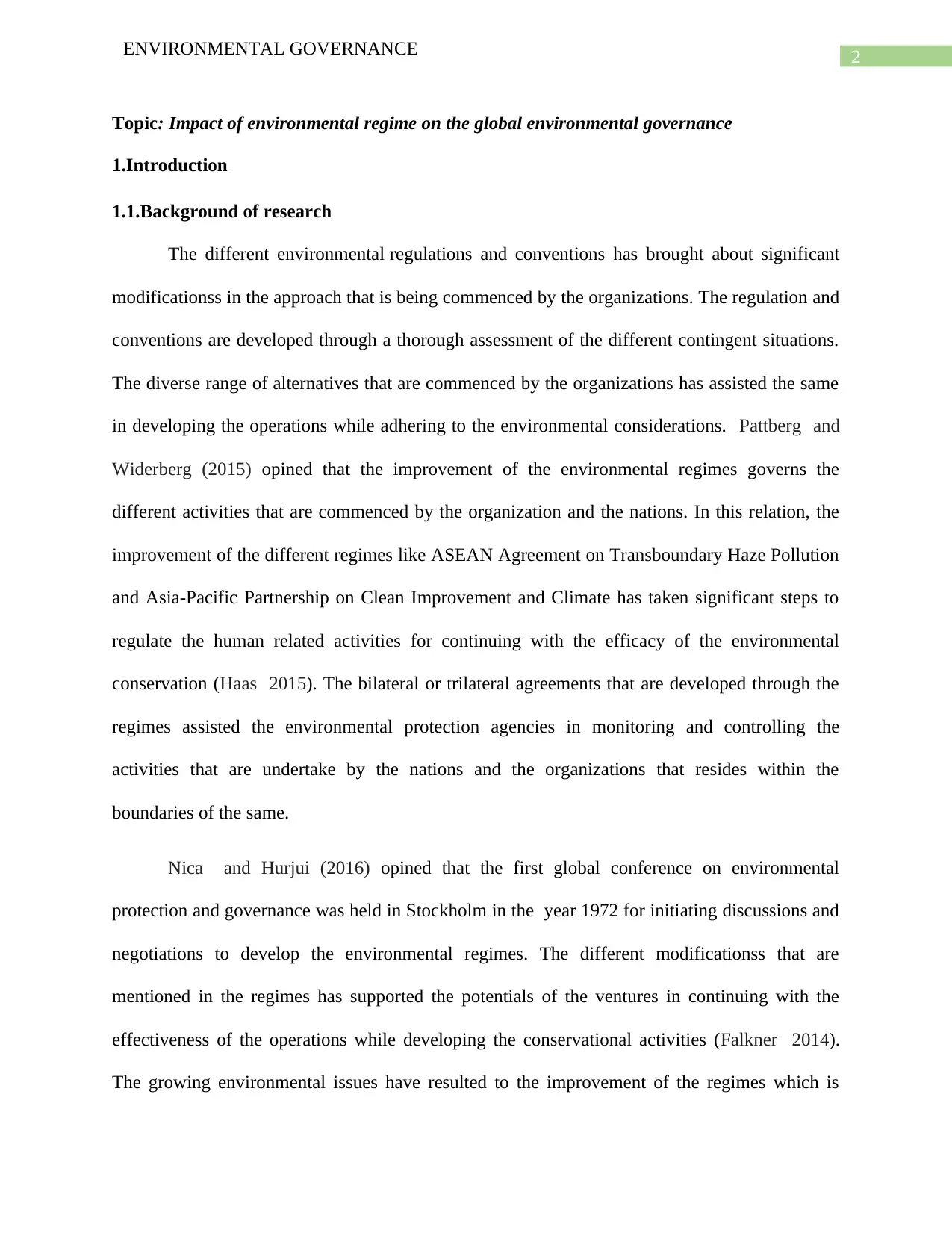
2ENVIRONMENTAL GOVERNANCE
Topic: Impact of environmental regime on the global environmental governance
1.Introduction
1.1.Background of research
The different environmental regulations and conventions has brought about significant
modificationss in the approach that is being commenced by the organizations. The regulation and
conventions are developed through a thorough assessment of the different contingent situations.
The diverse range of alternatives that are commenced by the organizations has assisted the same
in developing the operations while adhering to the environmental considerations. Pattberg and
Widerberg (2015) opined that the improvement of the environmental regimes governs the
different activities that are commenced by the organization and the nations. In this relation, the
improvement of the different regimes like ASEAN Agreement on Transboundary Haze Pollution
and Asia-Pacific Partnership on Clean Improvement and Climate has taken significant steps to
regulate the human related activities for continuing with the efficacy of the environmental
conservation (Haas 2015). The bilateral or trilateral agreements that are developed through the
regimes assisted the environmental protection agencies in monitoring and controlling the
activities that are undertake by the nations and the organizations that resides within the
boundaries of the same.
Nica and Hurjui (2016) opined that the first global conference on environmental
protection and governance was held in Stockholm in the year 1972 for initiating discussions and
negotiations to develop the environmental regimes. The different modificationss that are
mentioned in the regimes has supported the potentials of the ventures in continuing with the
effectiveness of the operations while developing the conservational activities (Falkner 2014).
The growing environmental issues have resulted to the improvement of the regimes which is
Topic: Impact of environmental regime on the global environmental governance
1.Introduction
1.1.Background of research
The different environmental regulations and conventions has brought about significant
modificationss in the approach that is being commenced by the organizations. The regulation and
conventions are developed through a thorough assessment of the different contingent situations.
The diverse range of alternatives that are commenced by the organizations has assisted the same
in developing the operations while adhering to the environmental considerations. Pattberg and
Widerberg (2015) opined that the improvement of the environmental regimes governs the
different activities that are commenced by the organization and the nations. In this relation, the
improvement of the different regimes like ASEAN Agreement on Transboundary Haze Pollution
and Asia-Pacific Partnership on Clean Improvement and Climate has taken significant steps to
regulate the human related activities for continuing with the efficacy of the environmental
conservation (Haas 2015). The bilateral or trilateral agreements that are developed through the
regimes assisted the environmental protection agencies in monitoring and controlling the
activities that are undertake by the nations and the organizations that resides within the
boundaries of the same.
Nica and Hurjui (2016) opined that the first global conference on environmental
protection and governance was held in Stockholm in the year 1972 for initiating discussions and
negotiations to develop the environmental regimes. The different modificationss that are
mentioned in the regimes has supported the potentials of the ventures in continuing with the
effectiveness of the operations while developing the conservational activities (Falkner 2014).
The growing environmental issues have resulted to the improvement of the regimes which is
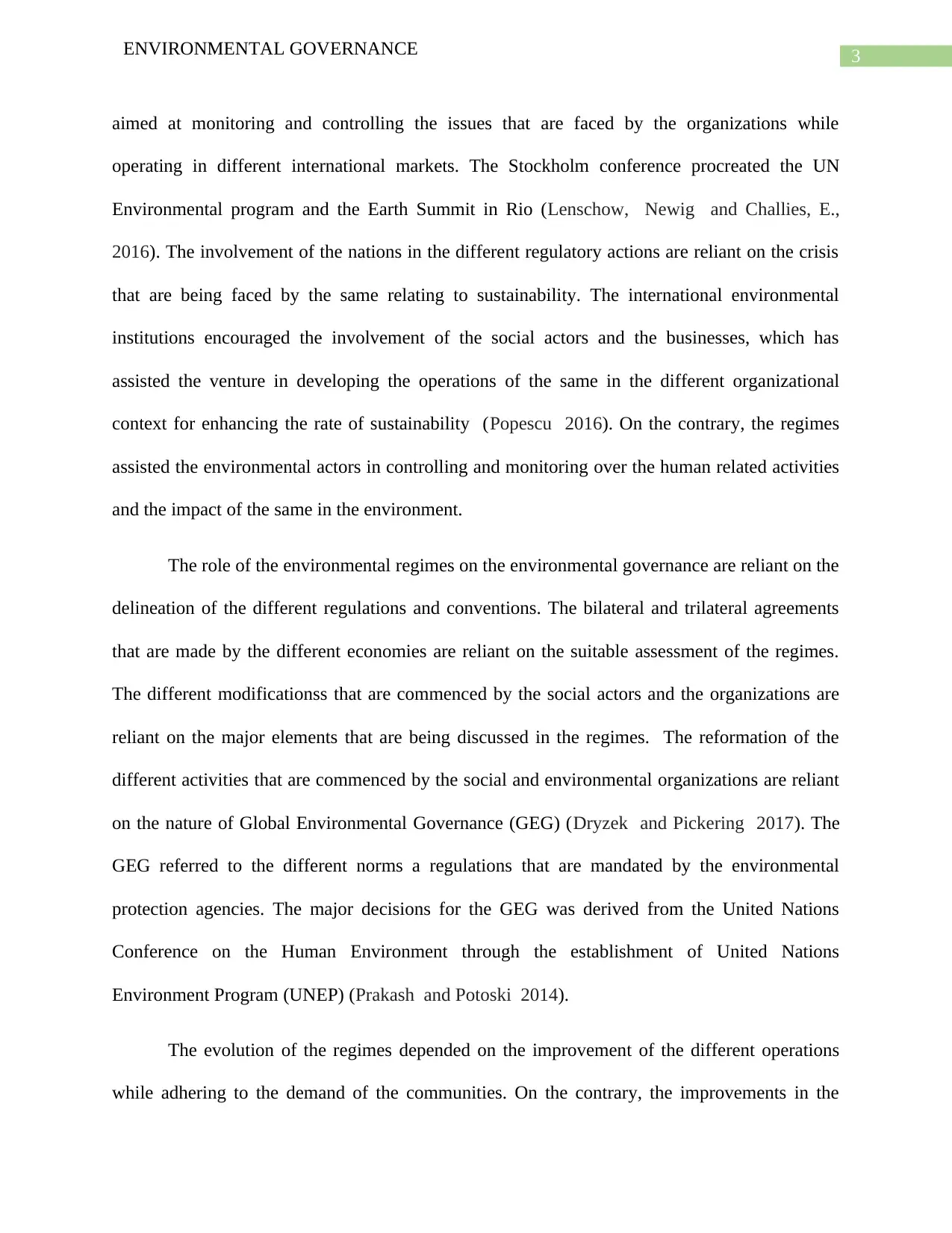
3ENVIRONMENTAL GOVERNANCE
aimed at monitoring and controlling the issues that are faced by the organizations while
operating in different international markets. The Stockholm conference procreated the UN
Environmental program and the Earth Summit in Rio (Lenschow, Newig and Challies, E.,
2016). The involvement of the nations in the different regulatory actions are reliant on the crisis
that are being faced by the same relating to sustainability. The international environmental
institutions encouraged the involvement of the social actors and the businesses, which has
assisted the venture in developing the operations of the same in the different organizational
context for enhancing the rate of sustainability (Popescu 2016). On the contrary, the regimes
assisted the environmental actors in controlling and monitoring over the human related activities
and the impact of the same in the environment.
The role of the environmental regimes on the environmental governance are reliant on the
delineation of the different regulations and conventions. The bilateral and trilateral agreements
that are made by the different economies are reliant on the suitable assessment of the regimes.
The different modificationss that are commenced by the social actors and the organizations are
reliant on the major elements that are being discussed in the regimes. The reformation of the
different activities that are commenced by the social and environmental organizations are reliant
on the nature of Global Environmental Governance (GEG) (Dryzek and Pickering 2017). The
GEG referred to the different norms a regulations that are mandated by the environmental
protection agencies. The major decisions for the GEG was derived from the United Nations
Conference on the Human Environment through the establishment of United Nations
Environment Program (UNEP) (Prakash and Potoski 2014).
The evolution of the regimes depended on the improvement of the different operations
while adhering to the demand of the communities. On the contrary, the improvements in the
aimed at monitoring and controlling the issues that are faced by the organizations while
operating in different international markets. The Stockholm conference procreated the UN
Environmental program and the Earth Summit in Rio (Lenschow, Newig and Challies, E.,
2016). The involvement of the nations in the different regulatory actions are reliant on the crisis
that are being faced by the same relating to sustainability. The international environmental
institutions encouraged the involvement of the social actors and the businesses, which has
assisted the venture in developing the operations of the same in the different organizational
context for enhancing the rate of sustainability (Popescu 2016). On the contrary, the regimes
assisted the environmental actors in controlling and monitoring over the human related activities
and the impact of the same in the environment.
The role of the environmental regimes on the environmental governance are reliant on the
delineation of the different regulations and conventions. The bilateral and trilateral agreements
that are made by the different economies are reliant on the suitable assessment of the regimes.
The different modificationss that are commenced by the social actors and the organizations are
reliant on the major elements that are being discussed in the regimes. The reformation of the
different activities that are commenced by the social and environmental organizations are reliant
on the nature of Global Environmental Governance (GEG) (Dryzek and Pickering 2017). The
GEG referred to the different norms a regulations that are mandated by the environmental
protection agencies. The major decisions for the GEG was derived from the United Nations
Conference on the Human Environment through the establishment of United Nations
Environment Program (UNEP) (Prakash and Potoski 2014).
The evolution of the regimes depended on the improvement of the different operations
while adhering to the demand of the communities. On the contrary, the improvements in the
Secure Best Marks with AI Grader
Need help grading? Try our AI Grader for instant feedback on your assignments.
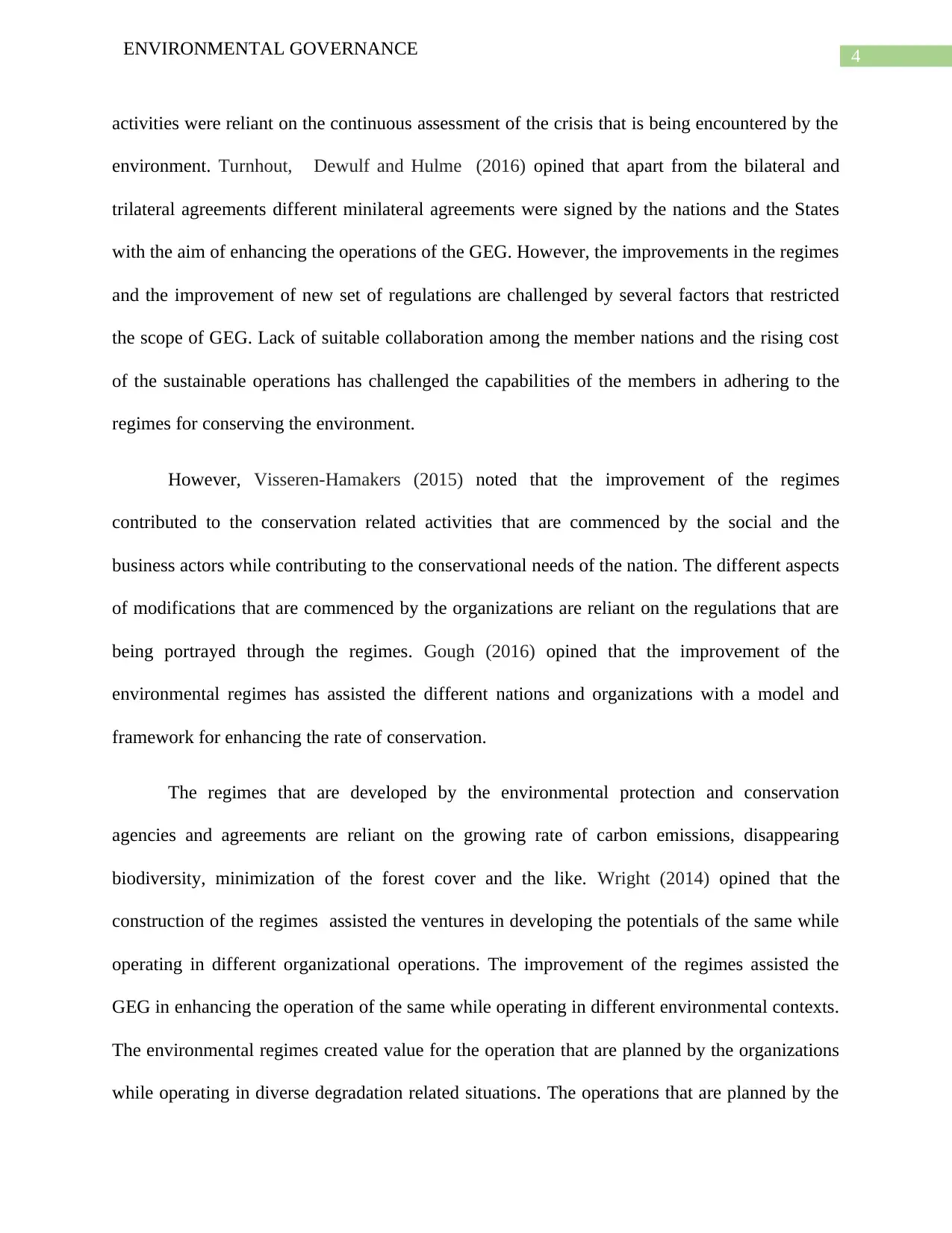
4ENVIRONMENTAL GOVERNANCE
activities were reliant on the continuous assessment of the crisis that is being encountered by the
environment. Turnhout, Dewulf and Hulme (2016) opined that apart from the bilateral and
trilateral agreements different minilateral agreements were signed by the nations and the States
with the aim of enhancing the operations of the GEG. However, the improvements in the regimes
and the improvement of new set of regulations are challenged by several factors that restricted
the scope of GEG. Lack of suitable collaboration among the member nations and the rising cost
of the sustainable operations has challenged the capabilities of the members in adhering to the
regimes for conserving the environment.
However, Visseren-Hamakers (2015) noted that the improvement of the regimes
contributed to the conservation related activities that are commenced by the social and the
business actors while contributing to the conservational needs of the nation. The different aspects
of modifications that are commenced by the organizations are reliant on the regulations that are
being portrayed through the regimes. Gough (2016) opined that the improvement of the
environmental regimes has assisted the different nations and organizations with a model and
framework for enhancing the rate of conservation.
The regimes that are developed by the environmental protection and conservation
agencies and agreements are reliant on the growing rate of carbon emissions, disappearing
biodiversity, minimization of the forest cover and the like. Wright (2014) opined that the
construction of the regimes assisted the ventures in developing the potentials of the same while
operating in different organizational operations. The improvement of the regimes assisted the
GEG in enhancing the operation of the same while operating in different environmental contexts.
The environmental regimes created value for the operation that are planned by the organizations
while operating in diverse degradation related situations. The operations that are planned by the
activities were reliant on the continuous assessment of the crisis that is being encountered by the
environment. Turnhout, Dewulf and Hulme (2016) opined that apart from the bilateral and
trilateral agreements different minilateral agreements were signed by the nations and the States
with the aim of enhancing the operations of the GEG. However, the improvements in the regimes
and the improvement of new set of regulations are challenged by several factors that restricted
the scope of GEG. Lack of suitable collaboration among the member nations and the rising cost
of the sustainable operations has challenged the capabilities of the members in adhering to the
regimes for conserving the environment.
However, Visseren-Hamakers (2015) noted that the improvement of the regimes
contributed to the conservation related activities that are commenced by the social and the
business actors while contributing to the conservational needs of the nation. The different aspects
of modifications that are commenced by the organizations are reliant on the regulations that are
being portrayed through the regimes. Gough (2016) opined that the improvement of the
environmental regimes has assisted the different nations and organizations with a model and
framework for enhancing the rate of conservation.
The regimes that are developed by the environmental protection and conservation
agencies and agreements are reliant on the growing rate of carbon emissions, disappearing
biodiversity, minimization of the forest cover and the like. Wright (2014) opined that the
construction of the regimes assisted the ventures in developing the potentials of the same while
operating in different organizational operations. The improvement of the regimes assisted the
GEG in enhancing the operation of the same while operating in different environmental contexts.
The environmental regimes created value for the operation that are planned by the organizations
while operating in diverse degradation related situations. The operations that are planned by the
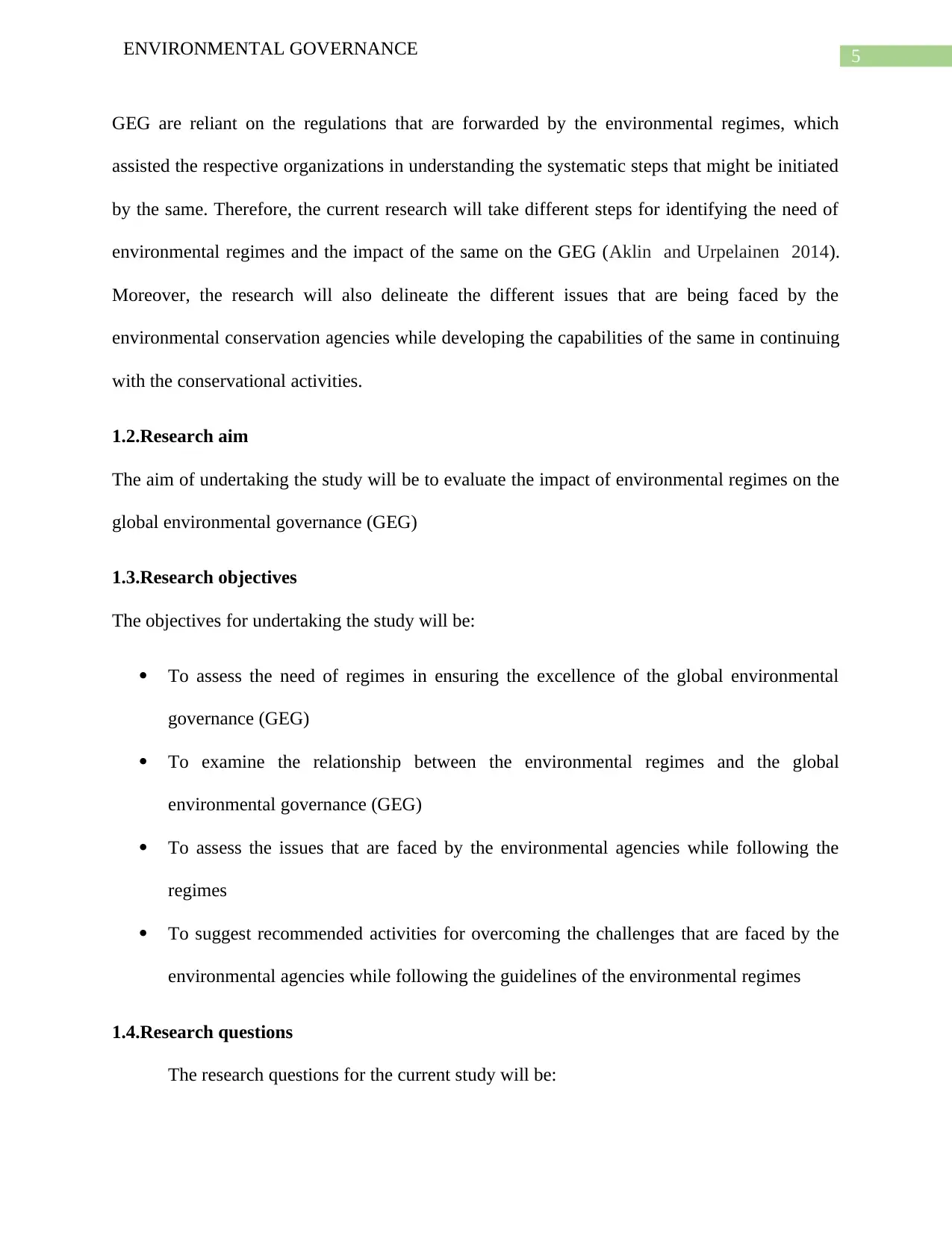
5ENVIRONMENTAL GOVERNANCE
GEG are reliant on the regulations that are forwarded by the environmental regimes, which
assisted the respective organizations in understanding the systematic steps that might be initiated
by the same. Therefore, the current research will take different steps for identifying the need of
environmental regimes and the impact of the same on the GEG (Aklin and Urpelainen 2014).
Moreover, the research will also delineate the different issues that are being faced by the
environmental conservation agencies while developing the capabilities of the same in continuing
with the conservational activities.
1.2.Research aim
The aim of undertaking the study will be to evaluate the impact of environmental regimes on the
global environmental governance (GEG)
1.3.Research objectives
The objectives for undertaking the study will be:
To assess the need of regimes in ensuring the excellence of the global environmental
governance (GEG)
To examine the relationship between the environmental regimes and the global
environmental governance (GEG)
To assess the issues that are faced by the environmental agencies while following the
regimes
To suggest recommended activities for overcoming the challenges that are faced by the
environmental agencies while following the guidelines of the environmental regimes
1.4.Research questions
The research questions for the current study will be:
GEG are reliant on the regulations that are forwarded by the environmental regimes, which
assisted the respective organizations in understanding the systematic steps that might be initiated
by the same. Therefore, the current research will take different steps for identifying the need of
environmental regimes and the impact of the same on the GEG (Aklin and Urpelainen 2014).
Moreover, the research will also delineate the different issues that are being faced by the
environmental conservation agencies while developing the capabilities of the same in continuing
with the conservational activities.
1.2.Research aim
The aim of undertaking the study will be to evaluate the impact of environmental regimes on the
global environmental governance (GEG)
1.3.Research objectives
The objectives for undertaking the study will be:
To assess the need of regimes in ensuring the excellence of the global environmental
governance (GEG)
To examine the relationship between the environmental regimes and the global
environmental governance (GEG)
To assess the issues that are faced by the environmental agencies while following the
regimes
To suggest recommended activities for overcoming the challenges that are faced by the
environmental agencies while following the guidelines of the environmental regimes
1.4.Research questions
The research questions for the current study will be:
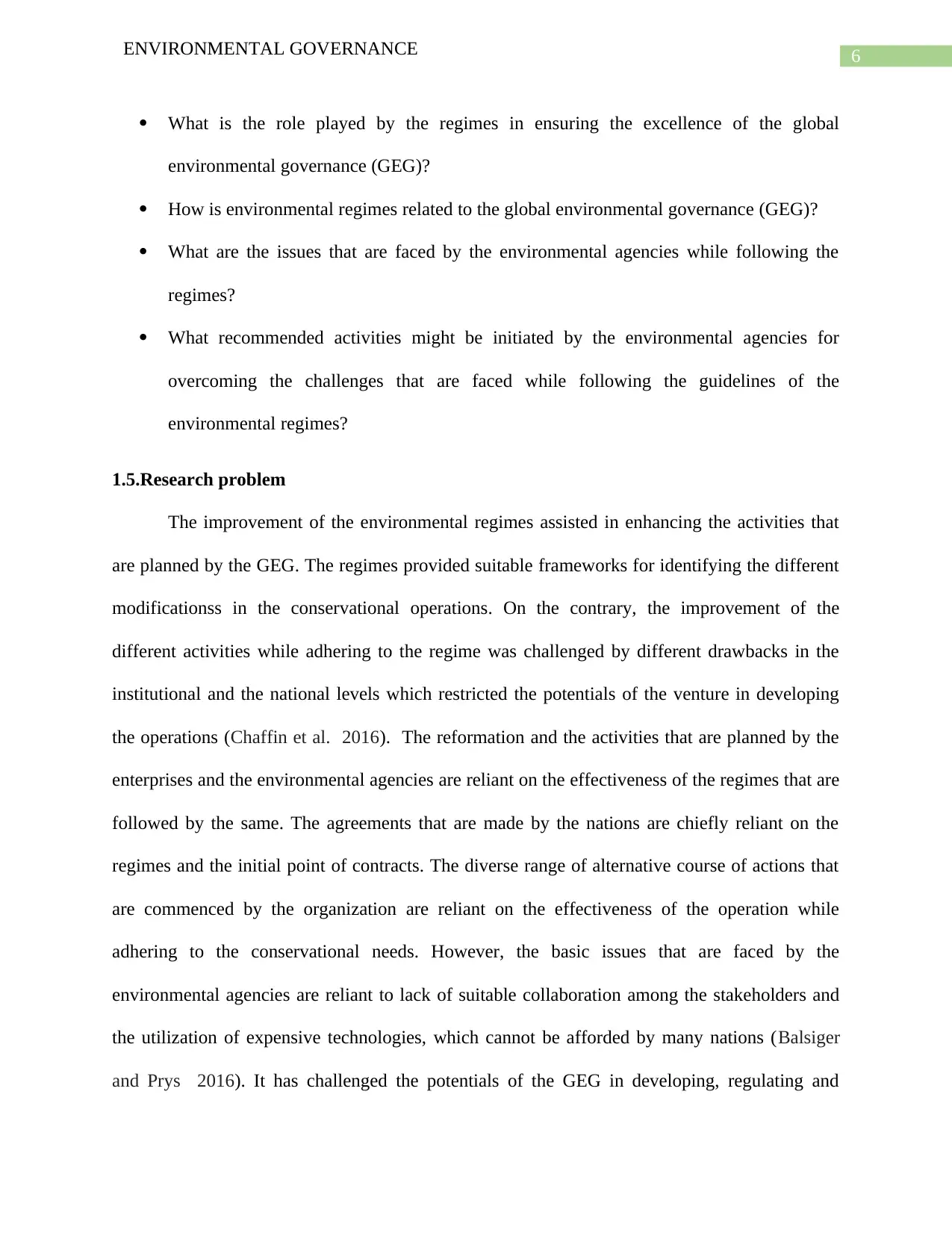
6ENVIRONMENTAL GOVERNANCE
What is the role played by the regimes in ensuring the excellence of the global
environmental governance (GEG)?
How is environmental regimes related to the global environmental governance (GEG)?
What are the issues that are faced by the environmental agencies while following the
regimes?
What recommended activities might be initiated by the environmental agencies for
overcoming the challenges that are faced while following the guidelines of the
environmental regimes?
1.5.Research problem
The improvement of the environmental regimes assisted in enhancing the activities that
are planned by the GEG. The regimes provided suitable frameworks for identifying the different
modificationss in the conservational operations. On the contrary, the improvement of the
different activities while adhering to the regime was challenged by different drawbacks in the
institutional and the national levels which restricted the potentials of the venture in developing
the operations (Chaffin et al. 2016). The reformation and the activities that are planned by the
enterprises and the environmental agencies are reliant on the effectiveness of the regimes that are
followed by the same. The agreements that are made by the nations are chiefly reliant on the
regimes and the initial point of contracts. The diverse range of alternative course of actions that
are commenced by the organization are reliant on the effectiveness of the operation while
adhering to the conservational needs. However, the basic issues that are faced by the
environmental agencies are reliant to lack of suitable collaboration among the stakeholders and
the utilization of expensive technologies, which cannot be afforded by many nations (Balsiger
and Prys 2016). It has challenged the potentials of the GEG in developing, regulating and
What is the role played by the regimes in ensuring the excellence of the global
environmental governance (GEG)?
How is environmental regimes related to the global environmental governance (GEG)?
What are the issues that are faced by the environmental agencies while following the
regimes?
What recommended activities might be initiated by the environmental agencies for
overcoming the challenges that are faced while following the guidelines of the
environmental regimes?
1.5.Research problem
The improvement of the environmental regimes assisted in enhancing the activities that
are planned by the GEG. The regimes provided suitable frameworks for identifying the different
modificationss in the conservational operations. On the contrary, the improvement of the
different activities while adhering to the regime was challenged by different drawbacks in the
institutional and the national levels which restricted the potentials of the venture in developing
the operations (Chaffin et al. 2016). The reformation and the activities that are planned by the
enterprises and the environmental agencies are reliant on the effectiveness of the regimes that are
followed by the same. The agreements that are made by the nations are chiefly reliant on the
regimes and the initial point of contracts. The diverse range of alternative course of actions that
are commenced by the organization are reliant on the effectiveness of the operation while
adhering to the conservational needs. However, the basic issues that are faced by the
environmental agencies are reliant to lack of suitable collaboration among the stakeholders and
the utilization of expensive technologies, which cannot be afforded by many nations (Balsiger
and Prys 2016). It has challenged the potentials of the GEG in developing, regulating and
Paraphrase This Document
Need a fresh take? Get an instant paraphrase of this document with our AI Paraphraser
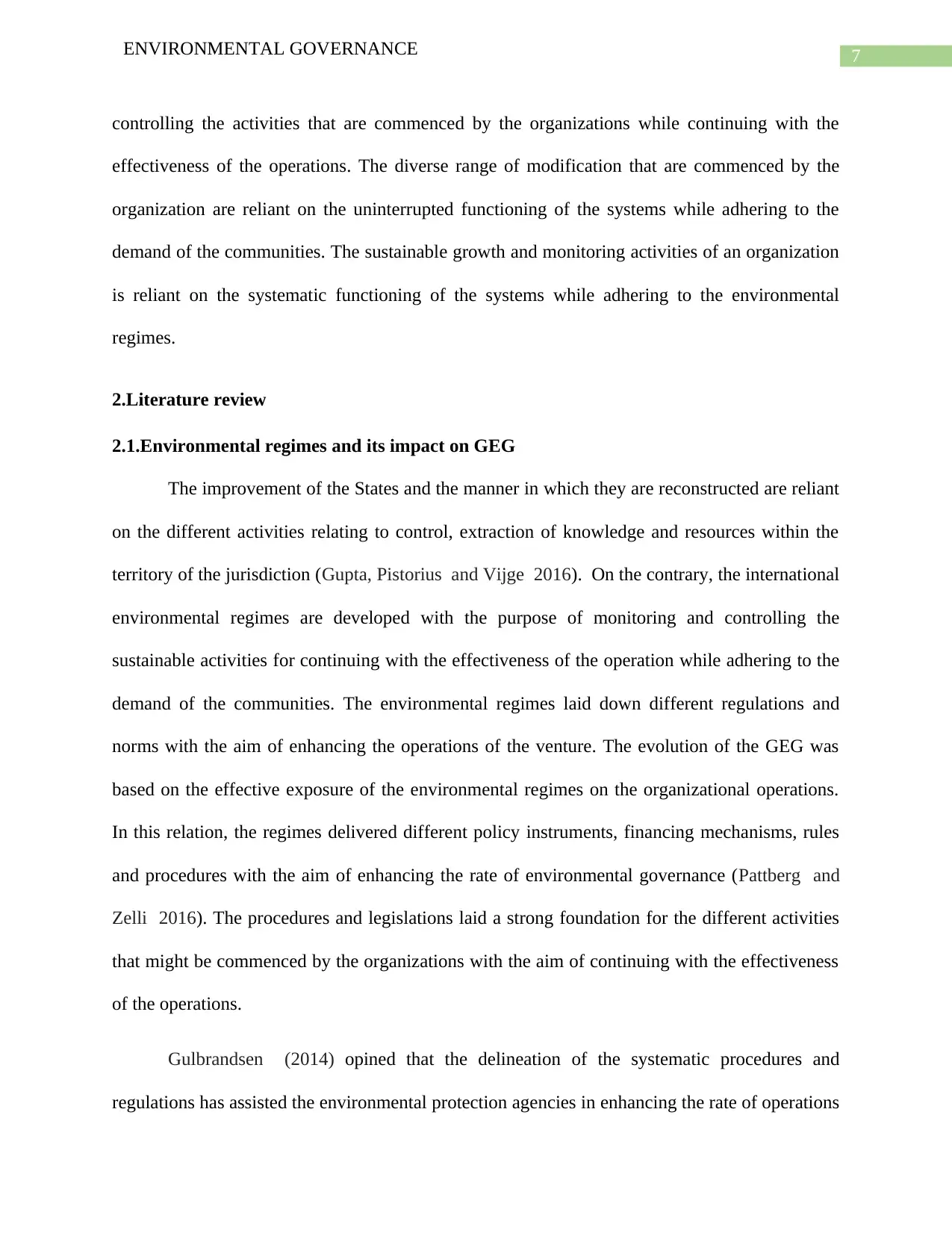
7ENVIRONMENTAL GOVERNANCE
controlling the activities that are commenced by the organizations while continuing with the
effectiveness of the operations. The diverse range of modification that are commenced by the
organization are reliant on the uninterrupted functioning of the systems while adhering to the
demand of the communities. The sustainable growth and monitoring activities of an organization
is reliant on the systematic functioning of the systems while adhering to the environmental
regimes.
2.Literature review
2.1.Environmental regimes and its impact on GEG
The improvement of the States and the manner in which they are reconstructed are reliant
on the different activities relating to control, extraction of knowledge and resources within the
territory of the jurisdiction (Gupta, Pistorius and Vijge 2016). On the contrary, the international
environmental regimes are developed with the purpose of monitoring and controlling the
sustainable activities for continuing with the effectiveness of the operation while adhering to the
demand of the communities. The environmental regimes laid down different regulations and
norms with the aim of enhancing the operations of the venture. The evolution of the GEG was
based on the effective exposure of the environmental regimes on the organizational operations.
In this relation, the regimes delivered different policy instruments, financing mechanisms, rules
and procedures with the aim of enhancing the rate of environmental governance (Pattberg and
Zelli 2016). The procedures and legislations laid a strong foundation for the different activities
that might be commenced by the organizations with the aim of continuing with the effectiveness
of the operations.
Gulbrandsen (2014) opined that the delineation of the systematic procedures and
regulations has assisted the environmental protection agencies in enhancing the rate of operations
controlling the activities that are commenced by the organizations while continuing with the
effectiveness of the operations. The diverse range of modification that are commenced by the
organization are reliant on the uninterrupted functioning of the systems while adhering to the
demand of the communities. The sustainable growth and monitoring activities of an organization
is reliant on the systematic functioning of the systems while adhering to the environmental
regimes.
2.Literature review
2.1.Environmental regimes and its impact on GEG
The improvement of the States and the manner in which they are reconstructed are reliant
on the different activities relating to control, extraction of knowledge and resources within the
territory of the jurisdiction (Gupta, Pistorius and Vijge 2016). On the contrary, the international
environmental regimes are developed with the purpose of monitoring and controlling the
sustainable activities for continuing with the effectiveness of the operation while adhering to the
demand of the communities. The environmental regimes laid down different regulations and
norms with the aim of enhancing the operations of the venture. The evolution of the GEG was
based on the effective exposure of the environmental regimes on the organizational operations.
In this relation, the regimes delivered different policy instruments, financing mechanisms, rules
and procedures with the aim of enhancing the rate of environmental governance (Pattberg and
Zelli 2016). The procedures and legislations laid a strong foundation for the different activities
that might be commenced by the organizations with the aim of continuing with the effectiveness
of the operations.
Gulbrandsen (2014) opined that the delineation of the systematic procedures and
regulations has assisted the environmental protection agencies in enhancing the rate of operations
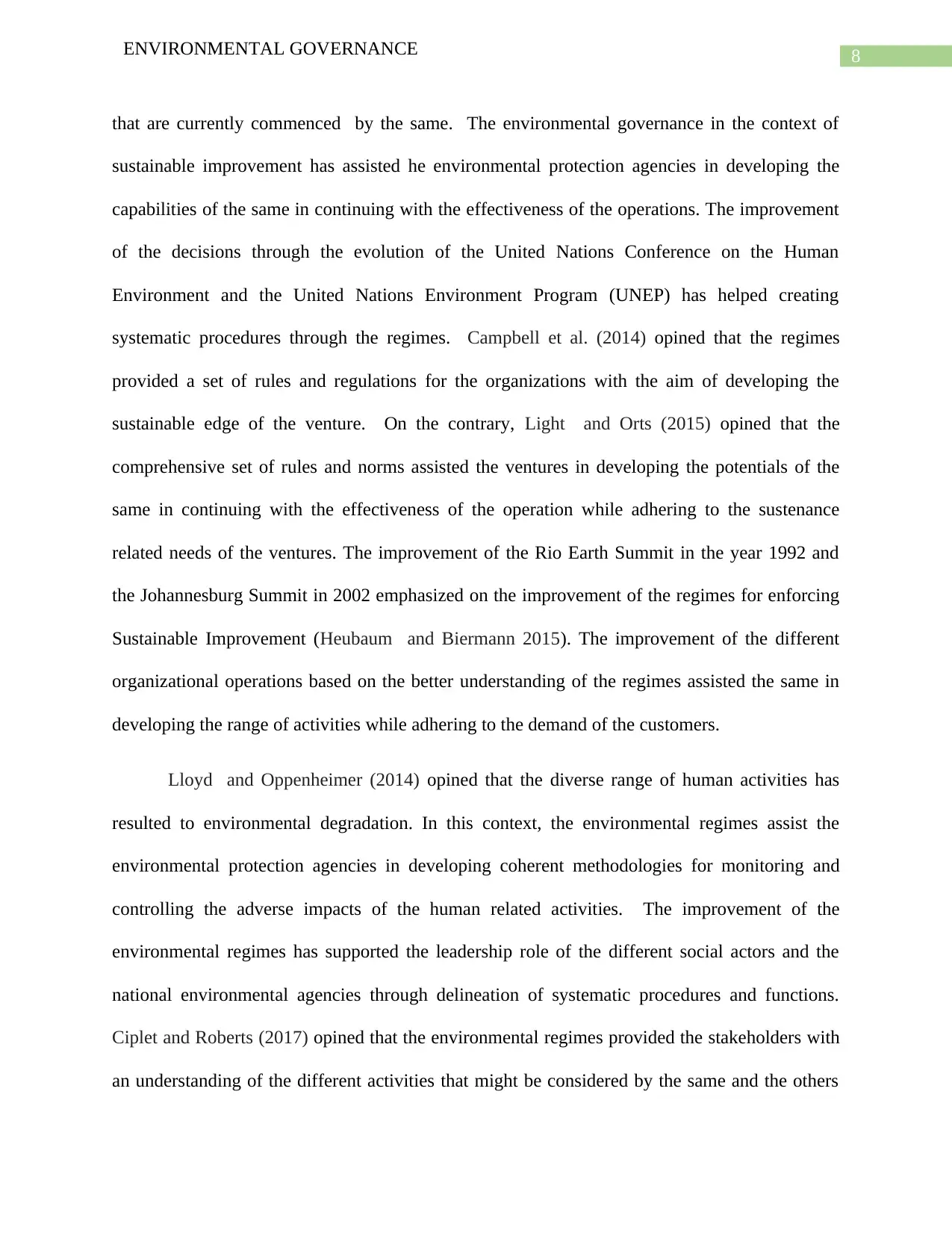
8ENVIRONMENTAL GOVERNANCE
that are currently commenced by the same. The environmental governance in the context of
sustainable improvement has assisted he environmental protection agencies in developing the
capabilities of the same in continuing with the effectiveness of the operations. The improvement
of the decisions through the evolution of the United Nations Conference on the Human
Environment and the United Nations Environment Program (UNEP) has helped creating
systematic procedures through the regimes. Campbell et al. (2014) opined that the regimes
provided a set of rules and regulations for the organizations with the aim of developing the
sustainable edge of the venture. On the contrary, Light and Orts (2015) opined that the
comprehensive set of rules and norms assisted the ventures in developing the potentials of the
same in continuing with the effectiveness of the operation while adhering to the sustenance
related needs of the ventures. The improvement of the Rio Earth Summit in the year 1992 and
the Johannesburg Summit in 2002 emphasized on the improvement of the regimes for enforcing
Sustainable Improvement (Heubaum and Biermann 2015). The improvement of the different
organizational operations based on the better understanding of the regimes assisted the same in
developing the range of activities while adhering to the demand of the customers.
Lloyd and Oppenheimer (2014) opined that the diverse range of human activities has
resulted to environmental degradation. In this context, the environmental regimes assist the
environmental protection agencies in developing coherent methodologies for monitoring and
controlling the adverse impacts of the human related activities. The improvement of the
environmental regimes has supported the leadership role of the different social actors and the
national environmental agencies through delineation of systematic procedures and functions.
Ciplet and Roberts (2017) opined that the environmental regimes provided the stakeholders with
an understanding of the different activities that might be considered by the same and the others
that are currently commenced by the same. The environmental governance in the context of
sustainable improvement has assisted he environmental protection agencies in developing the
capabilities of the same in continuing with the effectiveness of the operations. The improvement
of the decisions through the evolution of the United Nations Conference on the Human
Environment and the United Nations Environment Program (UNEP) has helped creating
systematic procedures through the regimes. Campbell et al. (2014) opined that the regimes
provided a set of rules and regulations for the organizations with the aim of developing the
sustainable edge of the venture. On the contrary, Light and Orts (2015) opined that the
comprehensive set of rules and norms assisted the ventures in developing the potentials of the
same in continuing with the effectiveness of the operation while adhering to the sustenance
related needs of the ventures. The improvement of the Rio Earth Summit in the year 1992 and
the Johannesburg Summit in 2002 emphasized on the improvement of the regimes for enforcing
Sustainable Improvement (Heubaum and Biermann 2015). The improvement of the different
organizational operations based on the better understanding of the regimes assisted the same in
developing the range of activities while adhering to the demand of the customers.
Lloyd and Oppenheimer (2014) opined that the diverse range of human activities has
resulted to environmental degradation. In this context, the environmental regimes assist the
environmental protection agencies in developing coherent methodologies for monitoring and
controlling the adverse impacts of the human related activities. The improvement of the
environmental regimes has supported the leadership role of the different social actors and the
national environmental agencies through delineation of systematic procedures and functions.
Ciplet and Roberts (2017) opined that the environmental regimes provided the stakeholders with
an understanding of the different activities that might be considered by the same and the others
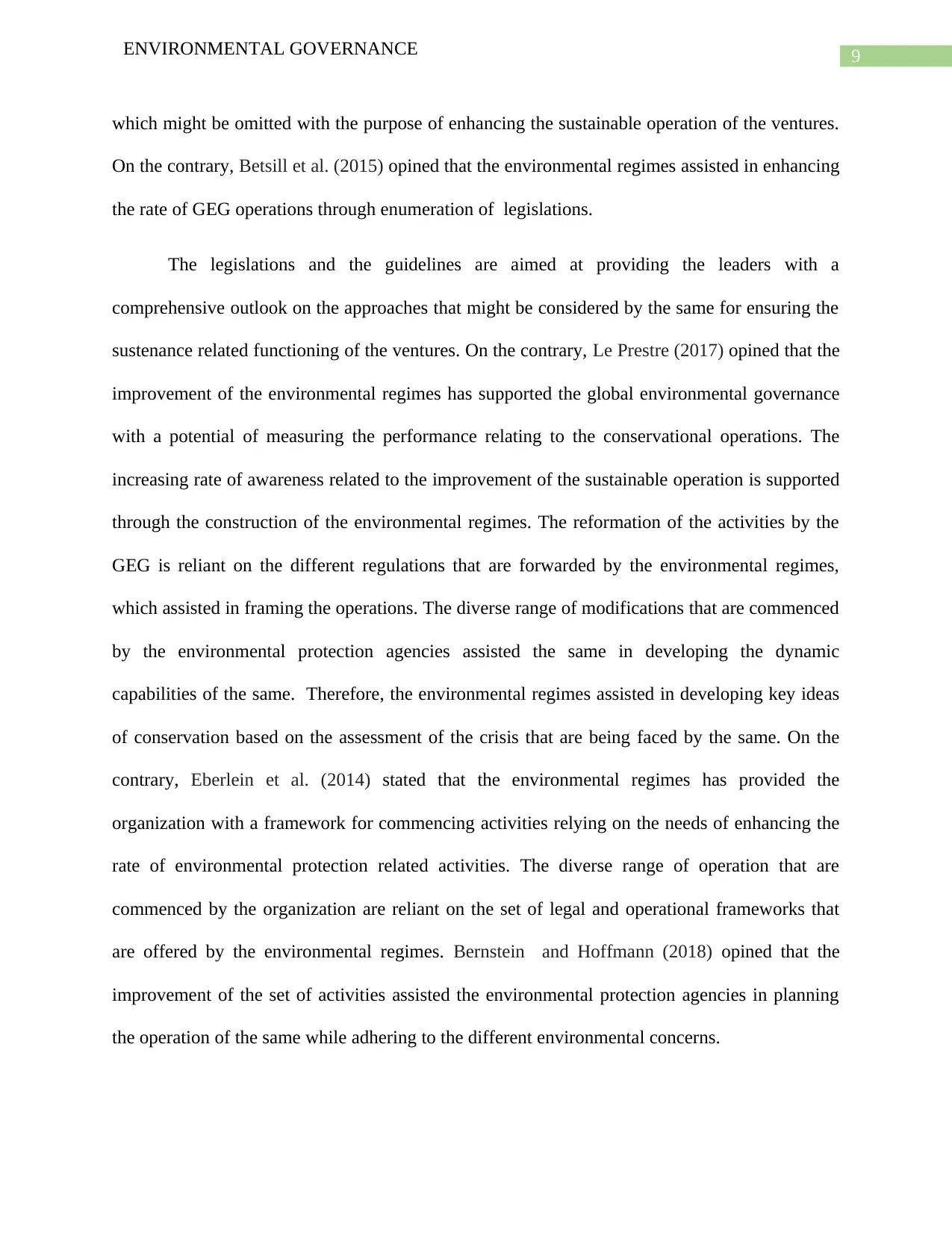
9ENVIRONMENTAL GOVERNANCE
which might be omitted with the purpose of enhancing the sustainable operation of the ventures.
On the contrary, Betsill et al. (2015) opined that the environmental regimes assisted in enhancing
the rate of GEG operations through enumeration of legislations.
The legislations and the guidelines are aimed at providing the leaders with a
comprehensive outlook on the approaches that might be considered by the same for ensuring the
sustenance related functioning of the ventures. On the contrary, Le Prestre (2017) opined that the
improvement of the environmental regimes has supported the global environmental governance
with a potential of measuring the performance relating to the conservational operations. The
increasing rate of awareness related to the improvement of the sustainable operation is supported
through the construction of the environmental regimes. The reformation of the activities by the
GEG is reliant on the different regulations that are forwarded by the environmental regimes,
which assisted in framing the operations. The diverse range of modifications that are commenced
by the environmental protection agencies assisted the same in developing the dynamic
capabilities of the same. Therefore, the environmental regimes assisted in developing key ideas
of conservation based on the assessment of the crisis that are being faced by the same. On the
contrary, Eberlein et al. (2014) stated that the environmental regimes has provided the
organization with a framework for commencing activities relying on the needs of enhancing the
rate of environmental protection related activities. The diverse range of operation that are
commenced by the organization are reliant on the set of legal and operational frameworks that
are offered by the environmental regimes. Bernstein and Hoffmann (2018) opined that the
improvement of the set of activities assisted the environmental protection agencies in planning
the operation of the same while adhering to the different environmental concerns.
which might be omitted with the purpose of enhancing the sustainable operation of the ventures.
On the contrary, Betsill et al. (2015) opined that the environmental regimes assisted in enhancing
the rate of GEG operations through enumeration of legislations.
The legislations and the guidelines are aimed at providing the leaders with a
comprehensive outlook on the approaches that might be considered by the same for ensuring the
sustenance related functioning of the ventures. On the contrary, Le Prestre (2017) opined that the
improvement of the environmental regimes has supported the global environmental governance
with a potential of measuring the performance relating to the conservational operations. The
increasing rate of awareness related to the improvement of the sustainable operation is supported
through the construction of the environmental regimes. The reformation of the activities by the
GEG is reliant on the different regulations that are forwarded by the environmental regimes,
which assisted in framing the operations. The diverse range of modifications that are commenced
by the environmental protection agencies assisted the same in developing the dynamic
capabilities of the same. Therefore, the environmental regimes assisted in developing key ideas
of conservation based on the assessment of the crisis that are being faced by the same. On the
contrary, Eberlein et al. (2014) stated that the environmental regimes has provided the
organization with a framework for commencing activities relying on the needs of enhancing the
rate of environmental protection related activities. The diverse range of operation that are
commenced by the organization are reliant on the set of legal and operational frameworks that
are offered by the environmental regimes. Bernstein and Hoffmann (2018) opined that the
improvement of the set of activities assisted the environmental protection agencies in planning
the operation of the same while adhering to the different environmental concerns.
Secure Best Marks with AI Grader
Need help grading? Try our AI Grader for instant feedback on your assignments.
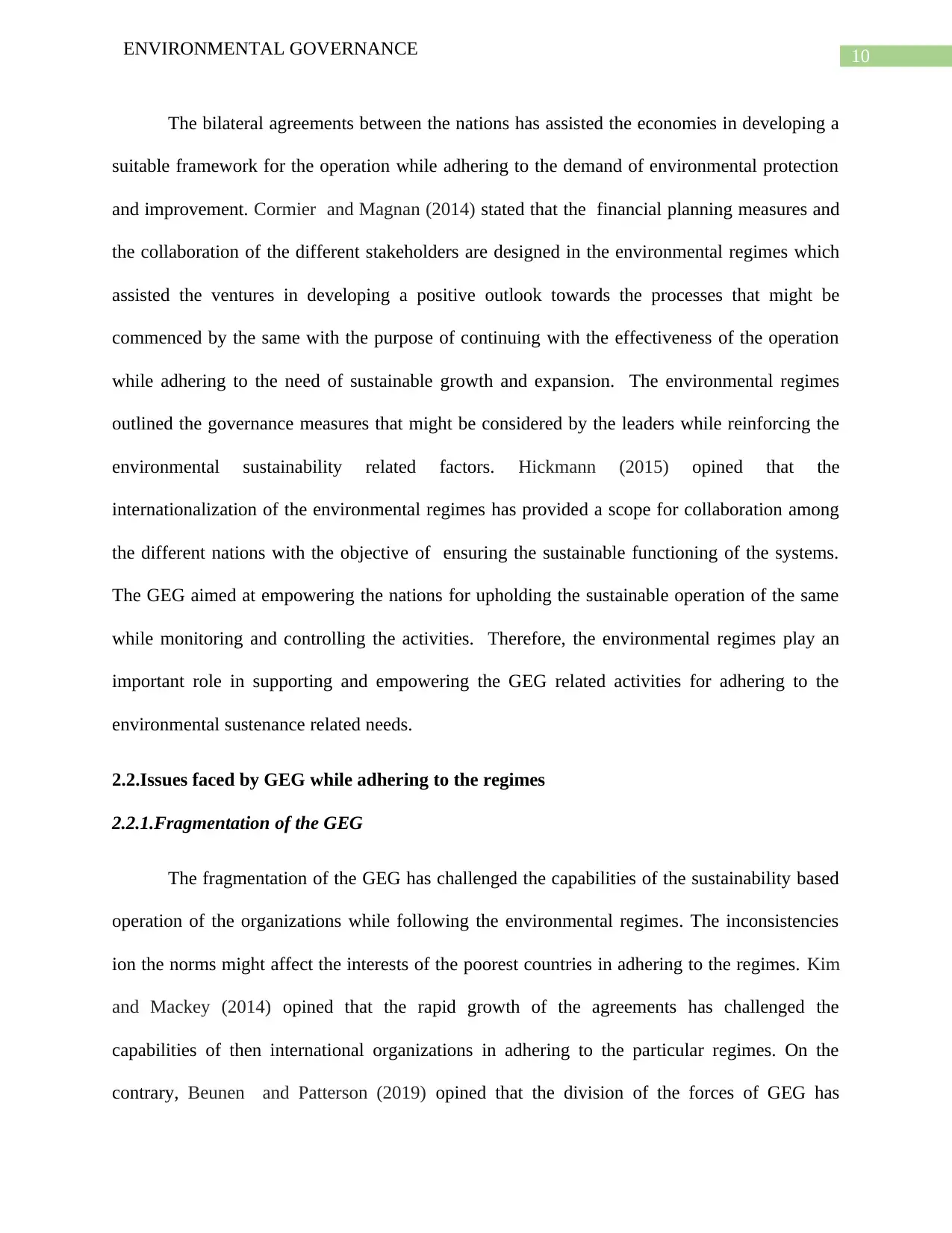
10ENVIRONMENTAL GOVERNANCE
The bilateral agreements between the nations has assisted the economies in developing a
suitable framework for the operation while adhering to the demand of environmental protection
and improvement. Cormier and Magnan (2014) stated that the financial planning measures and
the collaboration of the different stakeholders are designed in the environmental regimes which
assisted the ventures in developing a positive outlook towards the processes that might be
commenced by the same with the purpose of continuing with the effectiveness of the operation
while adhering to the need of sustainable growth and expansion. The environmental regimes
outlined the governance measures that might be considered by the leaders while reinforcing the
environmental sustainability related factors. Hickmann (2015) opined that the
internationalization of the environmental regimes has provided a scope for collaboration among
the different nations with the objective of ensuring the sustainable functioning of the systems.
The GEG aimed at empowering the nations for upholding the sustainable operation of the same
while monitoring and controlling the activities. Therefore, the environmental regimes play an
important role in supporting and empowering the GEG related activities for adhering to the
environmental sustenance related needs.
2.2.Issues faced by GEG while adhering to the regimes
2.2.1.Fragmentation of the GEG
The fragmentation of the GEG has challenged the capabilities of the sustainability based
operation of the organizations while following the environmental regimes. The inconsistencies
ion the norms might affect the interests of the poorest countries in adhering to the regimes. Kim
and Mackey (2014) opined that the rapid growth of the agreements has challenged the
capabilities of then international organizations in adhering to the particular regimes. On the
contrary, Beunen and Patterson (2019) opined that the division of the forces of GEG has
The bilateral agreements between the nations has assisted the economies in developing a
suitable framework for the operation while adhering to the demand of environmental protection
and improvement. Cormier and Magnan (2014) stated that the financial planning measures and
the collaboration of the different stakeholders are designed in the environmental regimes which
assisted the ventures in developing a positive outlook towards the processes that might be
commenced by the same with the purpose of continuing with the effectiveness of the operation
while adhering to the need of sustainable growth and expansion. The environmental regimes
outlined the governance measures that might be considered by the leaders while reinforcing the
environmental sustainability related factors. Hickmann (2015) opined that the
internationalization of the environmental regimes has provided a scope for collaboration among
the different nations with the objective of ensuring the sustainable functioning of the systems.
The GEG aimed at empowering the nations for upholding the sustainable operation of the same
while monitoring and controlling the activities. Therefore, the environmental regimes play an
important role in supporting and empowering the GEG related activities for adhering to the
environmental sustenance related needs.
2.2.Issues faced by GEG while adhering to the regimes
2.2.1.Fragmentation of the GEG
The fragmentation of the GEG has challenged the capabilities of the sustainability based
operation of the organizations while following the environmental regimes. The inconsistencies
ion the norms might affect the interests of the poorest countries in adhering to the regimes. Kim
and Mackey (2014) opined that the rapid growth of the agreements has challenged the
capabilities of then international organizations in adhering to the particular regimes. On the
contrary, Beunen and Patterson (2019) opined that the division of the forces of GEG has
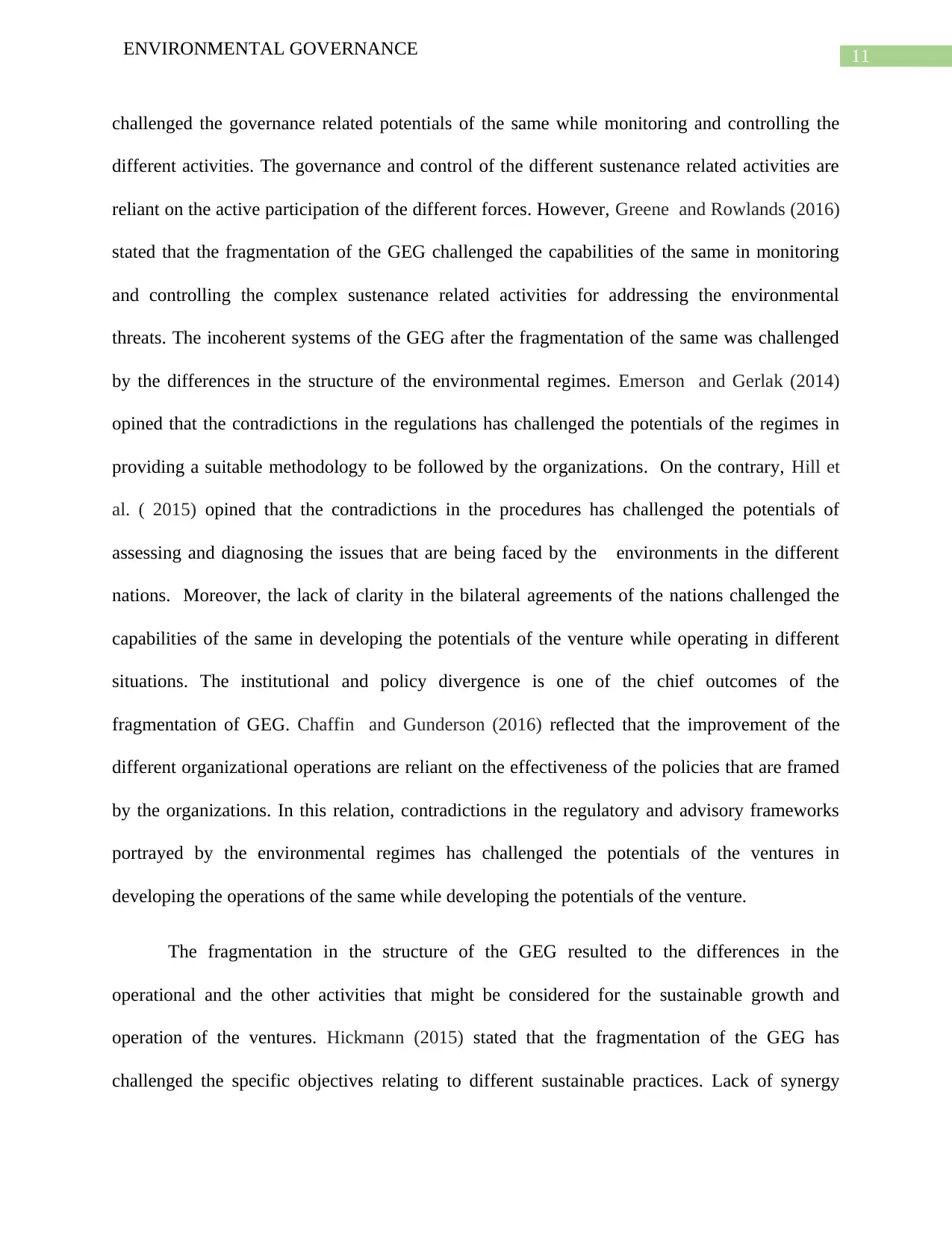
11ENVIRONMENTAL GOVERNANCE
challenged the governance related potentials of the same while monitoring and controlling the
different activities. The governance and control of the different sustenance related activities are
reliant on the active participation of the different forces. However, Greene and Rowlands (2016)
stated that the fragmentation of the GEG challenged the capabilities of the same in monitoring
and controlling the complex sustenance related activities for addressing the environmental
threats. The incoherent systems of the GEG after the fragmentation of the same was challenged
by the differences in the structure of the environmental regimes. Emerson and Gerlak (2014)
opined that the contradictions in the regulations has challenged the potentials of the regimes in
providing a suitable methodology to be followed by the organizations. On the contrary, Hill et
al. ( 2015) opined that the contradictions in the procedures has challenged the potentials of
assessing and diagnosing the issues that are being faced by the environments in the different
nations. Moreover, the lack of clarity in the bilateral agreements of the nations challenged the
capabilities of the same in developing the potentials of the venture while operating in different
situations. The institutional and policy divergence is one of the chief outcomes of the
fragmentation of GEG. Chaffin and Gunderson (2016) reflected that the improvement of the
different organizational operations are reliant on the effectiveness of the policies that are framed
by the organizations. In this relation, contradictions in the regulatory and advisory frameworks
portrayed by the environmental regimes has challenged the potentials of the ventures in
developing the operations of the same while developing the potentials of the venture.
The fragmentation in the structure of the GEG resulted to the differences in the
operational and the other activities that might be considered for the sustainable growth and
operation of the ventures. Hickmann (2015) stated that the fragmentation of the GEG has
challenged the specific objectives relating to different sustainable practices. Lack of synergy
challenged the governance related potentials of the same while monitoring and controlling the
different activities. The governance and control of the different sustenance related activities are
reliant on the active participation of the different forces. However, Greene and Rowlands (2016)
stated that the fragmentation of the GEG challenged the capabilities of the same in monitoring
and controlling the complex sustenance related activities for addressing the environmental
threats. The incoherent systems of the GEG after the fragmentation of the same was challenged
by the differences in the structure of the environmental regimes. Emerson and Gerlak (2014)
opined that the contradictions in the regulations has challenged the potentials of the regimes in
providing a suitable methodology to be followed by the organizations. On the contrary, Hill et
al. ( 2015) opined that the contradictions in the procedures has challenged the potentials of
assessing and diagnosing the issues that are being faced by the environments in the different
nations. Moreover, the lack of clarity in the bilateral agreements of the nations challenged the
capabilities of the same in developing the potentials of the venture while operating in different
situations. The institutional and policy divergence is one of the chief outcomes of the
fragmentation of GEG. Chaffin and Gunderson (2016) reflected that the improvement of the
different organizational operations are reliant on the effectiveness of the policies that are framed
by the organizations. In this relation, contradictions in the regulatory and advisory frameworks
portrayed by the environmental regimes has challenged the potentials of the ventures in
developing the operations of the same while developing the potentials of the venture.
The fragmentation in the structure of the GEG resulted to the differences in the
operational and the other activities that might be considered for the sustainable growth and
operation of the ventures. Hickmann (2015) stated that the fragmentation of the GEG has
challenged the specific objectives relating to different sustainable practices. Lack of synergy
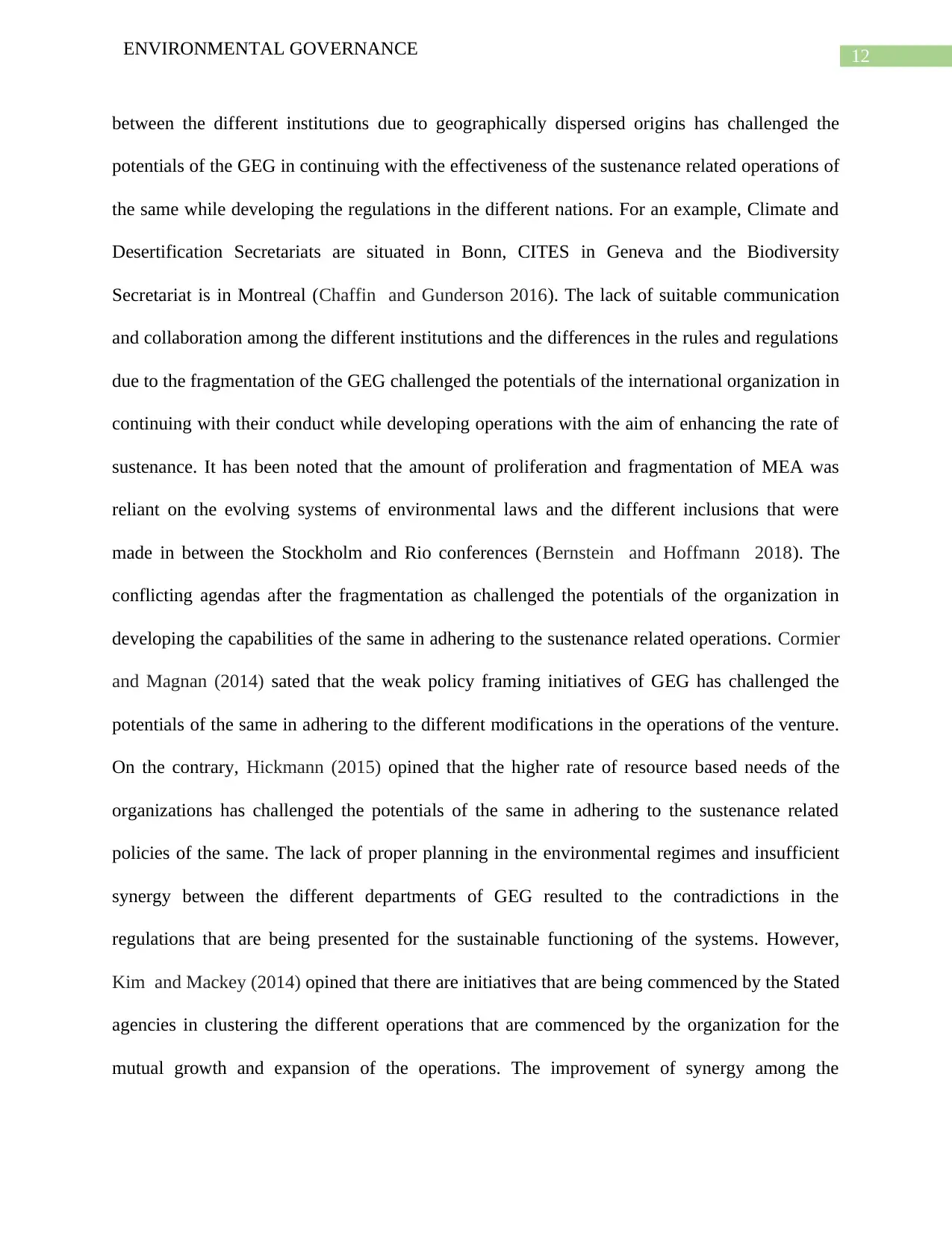
12ENVIRONMENTAL GOVERNANCE
between the different institutions due to geographically dispersed origins has challenged the
potentials of the GEG in continuing with the effectiveness of the sustenance related operations of
the same while developing the regulations in the different nations. For an example, Climate and
Desertification Secretariats are situated in Bonn, CITES in Geneva and the Biodiversity
Secretariat is in Montreal (Chaffin and Gunderson 2016). The lack of suitable communication
and collaboration among the different institutions and the differences in the rules and regulations
due to the fragmentation of the GEG challenged the potentials of the international organization in
continuing with their conduct while developing operations with the aim of enhancing the rate of
sustenance. It has been noted that the amount of proliferation and fragmentation of MEA was
reliant on the evolving systems of environmental laws and the different inclusions that were
made in between the Stockholm and Rio conferences (Bernstein and Hoffmann 2018). The
conflicting agendas after the fragmentation as challenged the potentials of the organization in
developing the capabilities of the same in adhering to the sustenance related operations. Cormier
and Magnan (2014) sated that the weak policy framing initiatives of GEG has challenged the
potentials of the same in adhering to the different modifications in the operations of the venture.
On the contrary, Hickmann (2015) opined that the higher rate of resource based needs of the
organizations has challenged the potentials of the same in adhering to the sustenance related
policies of the same. The lack of proper planning in the environmental regimes and insufficient
synergy between the different departments of GEG resulted to the contradictions in the
regulations that are being presented for the sustainable functioning of the systems. However,
Kim and Mackey (2014) opined that there are initiatives that are being commenced by the Stated
agencies in clustering the different operations that are commenced by the organization for the
mutual growth and expansion of the operations. The improvement of synergy among the
between the different institutions due to geographically dispersed origins has challenged the
potentials of the GEG in continuing with the effectiveness of the sustenance related operations of
the same while developing the regulations in the different nations. For an example, Climate and
Desertification Secretariats are situated in Bonn, CITES in Geneva and the Biodiversity
Secretariat is in Montreal (Chaffin and Gunderson 2016). The lack of suitable communication
and collaboration among the different institutions and the differences in the rules and regulations
due to the fragmentation of the GEG challenged the potentials of the international organization in
continuing with their conduct while developing operations with the aim of enhancing the rate of
sustenance. It has been noted that the amount of proliferation and fragmentation of MEA was
reliant on the evolving systems of environmental laws and the different inclusions that were
made in between the Stockholm and Rio conferences (Bernstein and Hoffmann 2018). The
conflicting agendas after the fragmentation as challenged the potentials of the organization in
developing the capabilities of the same in adhering to the sustenance related operations. Cormier
and Magnan (2014) sated that the weak policy framing initiatives of GEG has challenged the
potentials of the same in adhering to the different modifications in the operations of the venture.
On the contrary, Hickmann (2015) opined that the higher rate of resource based needs of the
organizations has challenged the potentials of the same in adhering to the sustenance related
policies of the same. The lack of proper planning in the environmental regimes and insufficient
synergy between the different departments of GEG resulted to the contradictions in the
regulations that are being presented for the sustainable functioning of the systems. However,
Kim and Mackey (2014) opined that there are initiatives that are being commenced by the Stated
agencies in clustering the different operations that are commenced by the organization for the
mutual growth and expansion of the operations. The improvement of synergy among the
Paraphrase This Document
Need a fresh take? Get an instant paraphrase of this document with our AI Paraphraser
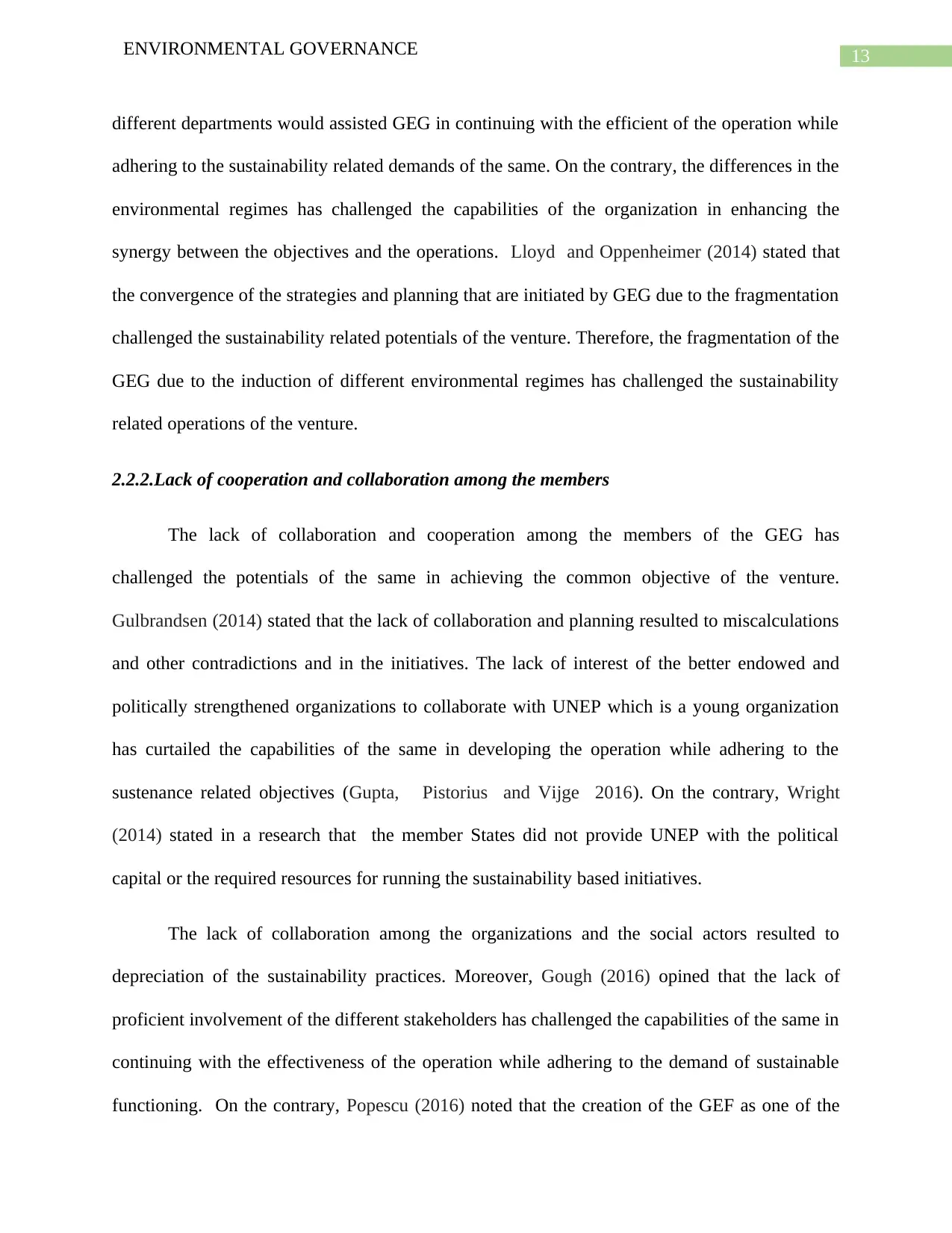
13ENVIRONMENTAL GOVERNANCE
different departments would assisted GEG in continuing with the efficient of the operation while
adhering to the sustainability related demands of the same. On the contrary, the differences in the
environmental regimes has challenged the capabilities of the organization in enhancing the
synergy between the objectives and the operations. Lloyd and Oppenheimer (2014) stated that
the convergence of the strategies and planning that are initiated by GEG due to the fragmentation
challenged the sustainability related potentials of the venture. Therefore, the fragmentation of the
GEG due to the induction of different environmental regimes has challenged the sustainability
related operations of the venture.
2.2.2.Lack of cooperation and collaboration among the members
The lack of collaboration and cooperation among the members of the GEG has
challenged the potentials of the same in achieving the common objective of the venture.
Gulbrandsen (2014) stated that the lack of collaboration and planning resulted to miscalculations
and other contradictions and in the initiatives. The lack of interest of the better endowed and
politically strengthened organizations to collaborate with UNEP which is a young organization
has curtailed the capabilities of the same in developing the operation while adhering to the
sustenance related objectives (Gupta, Pistorius and Vijge 2016). On the contrary, Wright
(2014) stated in a research that the member States did not provide UNEP with the political
capital or the required resources for running the sustainability based initiatives.
The lack of collaboration among the organizations and the social actors resulted to
depreciation of the sustainability practices. Moreover, Gough (2016) opined that the lack of
proficient involvement of the different stakeholders has challenged the capabilities of the same in
continuing with the effectiveness of the operation while adhering to the demand of sustainable
functioning. On the contrary, Popescu (2016) noted that the creation of the GEF as one of the
different departments would assisted GEG in continuing with the efficient of the operation while
adhering to the sustainability related demands of the same. On the contrary, the differences in the
environmental regimes has challenged the capabilities of the organization in enhancing the
synergy between the objectives and the operations. Lloyd and Oppenheimer (2014) stated that
the convergence of the strategies and planning that are initiated by GEG due to the fragmentation
challenged the sustainability related potentials of the venture. Therefore, the fragmentation of the
GEG due to the induction of different environmental regimes has challenged the sustainability
related operations of the venture.
2.2.2.Lack of cooperation and collaboration among the members
The lack of collaboration and cooperation among the members of the GEG has
challenged the potentials of the same in achieving the common objective of the venture.
Gulbrandsen (2014) stated that the lack of collaboration and planning resulted to miscalculations
and other contradictions and in the initiatives. The lack of interest of the better endowed and
politically strengthened organizations to collaborate with UNEP which is a young organization
has curtailed the capabilities of the same in developing the operation while adhering to the
sustenance related objectives (Gupta, Pistorius and Vijge 2016). On the contrary, Wright
(2014) stated in a research that the member States did not provide UNEP with the political
capital or the required resources for running the sustainability based initiatives.
The lack of collaboration among the organizations and the social actors resulted to
depreciation of the sustainability practices. Moreover, Gough (2016) opined that the lack of
proficient involvement of the different stakeholders has challenged the capabilities of the same in
continuing with the effectiveness of the operation while adhering to the demand of sustainable
functioning. On the contrary, Popescu (2016) noted that the creation of the GEF as one of the
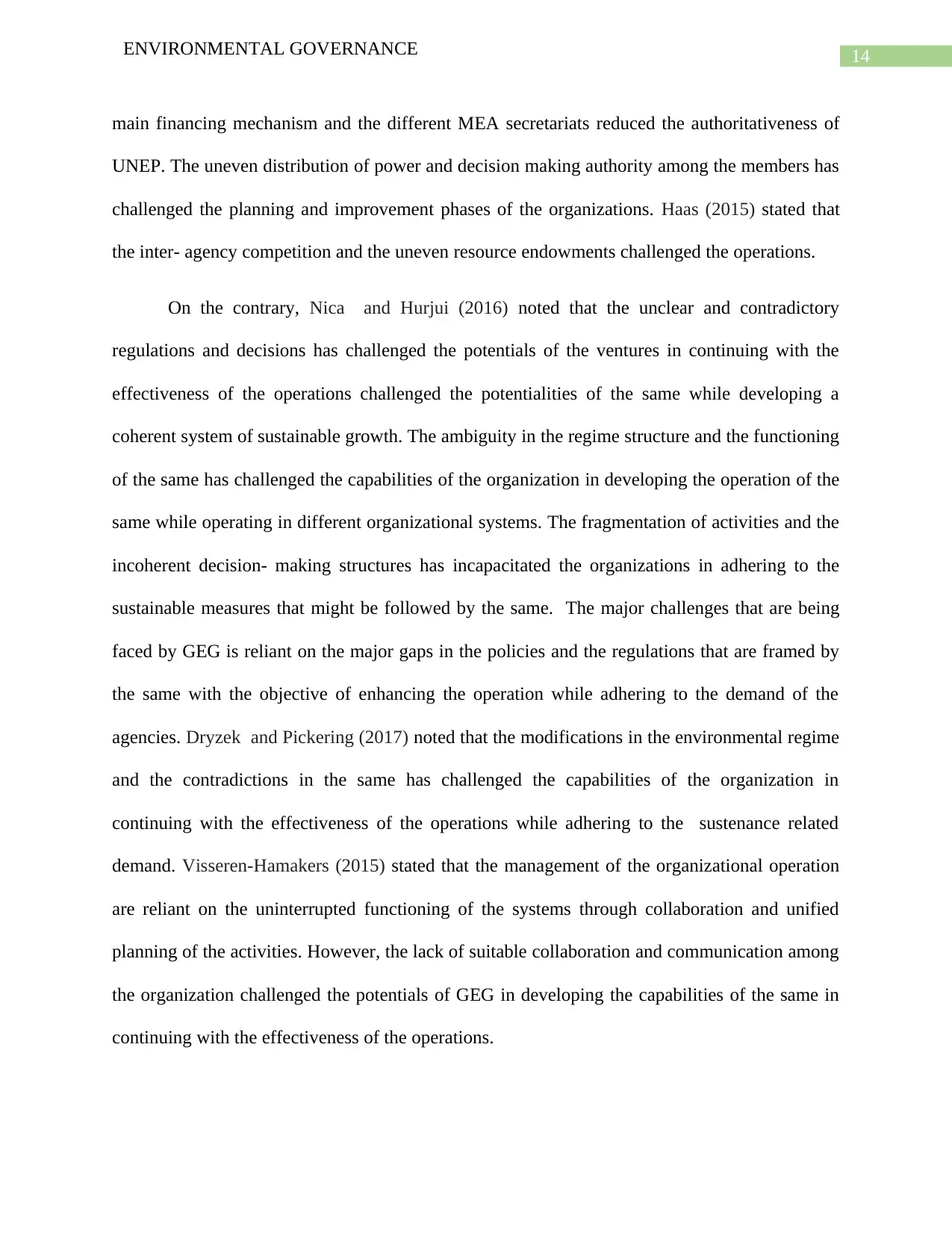
14ENVIRONMENTAL GOVERNANCE
main financing mechanism and the different MEA secretariats reduced the authoritativeness of
UNEP. The uneven distribution of power and decision making authority among the members has
challenged the planning and improvement phases of the organizations. Haas (2015) stated that
the inter- agency competition and the uneven resource endowments challenged the operations.
On the contrary, Nica and Hurjui (2016) noted that the unclear and contradictory
regulations and decisions has challenged the potentials of the ventures in continuing with the
effectiveness of the operations challenged the potentialities of the same while developing a
coherent system of sustainable growth. The ambiguity in the regime structure and the functioning
of the same has challenged the capabilities of the organization in developing the operation of the
same while operating in different organizational systems. The fragmentation of activities and the
incoherent decision- making structures has incapacitated the organizations in adhering to the
sustainable measures that might be followed by the same. The major challenges that are being
faced by GEG is reliant on the major gaps in the policies and the regulations that are framed by
the same with the objective of enhancing the operation while adhering to the demand of the
agencies. Dryzek and Pickering (2017) noted that the modifications in the environmental regime
and the contradictions in the same has challenged the capabilities of the organization in
continuing with the effectiveness of the operations while adhering to the sustenance related
demand. Visseren-Hamakers (2015) stated that the management of the organizational operation
are reliant on the uninterrupted functioning of the systems through collaboration and unified
planning of the activities. However, the lack of suitable collaboration and communication among
the organization challenged the potentials of GEG in developing the capabilities of the same in
continuing with the effectiveness of the operations.
main financing mechanism and the different MEA secretariats reduced the authoritativeness of
UNEP. The uneven distribution of power and decision making authority among the members has
challenged the planning and improvement phases of the organizations. Haas (2015) stated that
the inter- agency competition and the uneven resource endowments challenged the operations.
On the contrary, Nica and Hurjui (2016) noted that the unclear and contradictory
regulations and decisions has challenged the potentials of the ventures in continuing with the
effectiveness of the operations challenged the potentialities of the same while developing a
coherent system of sustainable growth. The ambiguity in the regime structure and the functioning
of the same has challenged the capabilities of the organization in developing the operation of the
same while operating in different organizational systems. The fragmentation of activities and the
incoherent decision- making structures has incapacitated the organizations in adhering to the
sustainable measures that might be followed by the same. The major challenges that are being
faced by GEG is reliant on the major gaps in the policies and the regulations that are framed by
the same with the objective of enhancing the operation while adhering to the demand of the
agencies. Dryzek and Pickering (2017) noted that the modifications in the environmental regime
and the contradictions in the same has challenged the capabilities of the organization in
continuing with the effectiveness of the operations while adhering to the sustenance related
demand. Visseren-Hamakers (2015) stated that the management of the organizational operation
are reliant on the uninterrupted functioning of the systems through collaboration and unified
planning of the activities. However, the lack of suitable collaboration and communication among
the organization challenged the potentials of GEG in developing the capabilities of the same in
continuing with the effectiveness of the operations.
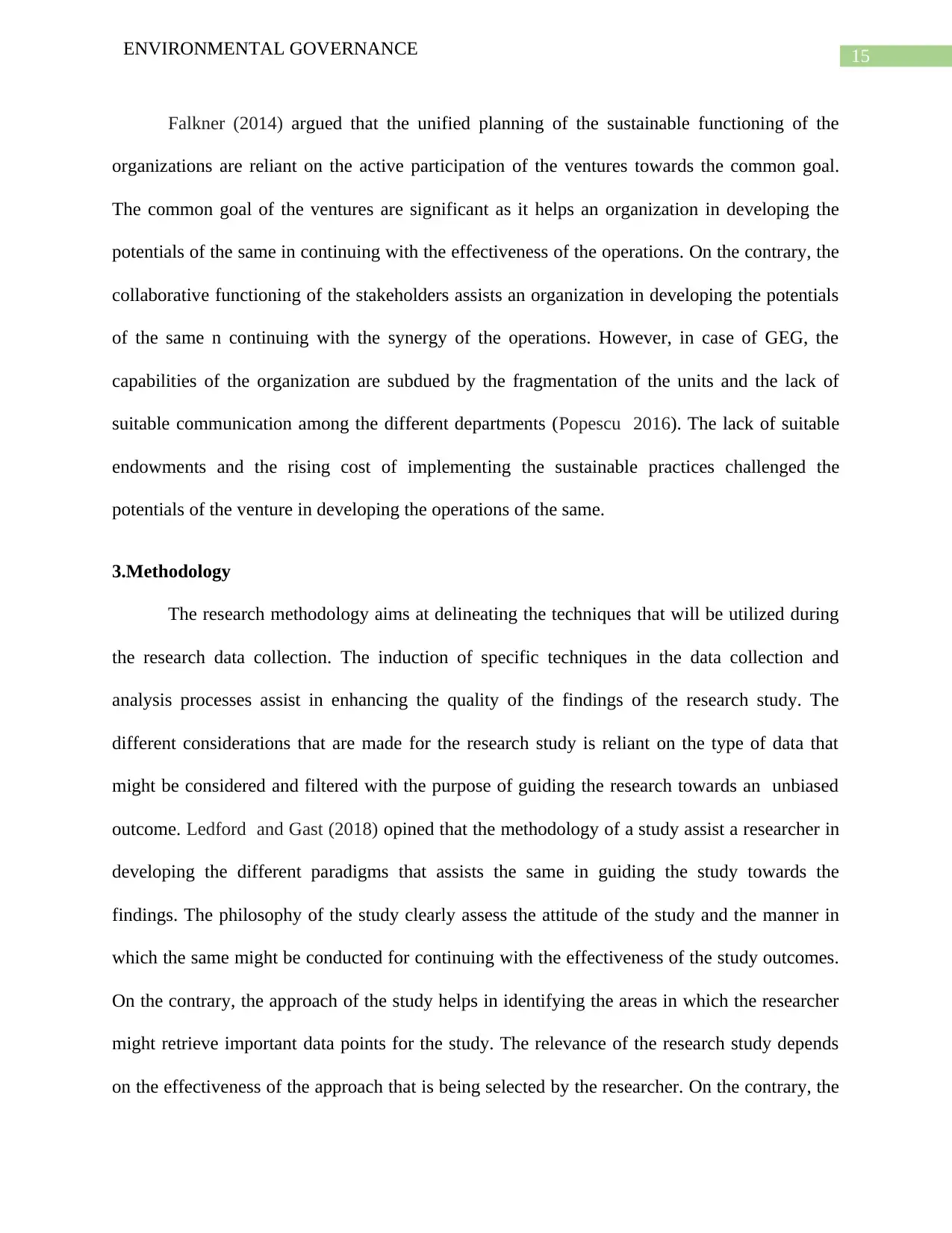
15ENVIRONMENTAL GOVERNANCE
Falkner (2014) argued that the unified planning of the sustainable functioning of the
organizations are reliant on the active participation of the ventures towards the common goal.
The common goal of the ventures are significant as it helps an organization in developing the
potentials of the same in continuing with the effectiveness of the operations. On the contrary, the
collaborative functioning of the stakeholders assists an organization in developing the potentials
of the same n continuing with the synergy of the operations. However, in case of GEG, the
capabilities of the organization are subdued by the fragmentation of the units and the lack of
suitable communication among the different departments (Popescu 2016). The lack of suitable
endowments and the rising cost of implementing the sustainable practices challenged the
potentials of the venture in developing the operations of the same.
3.Methodology
The research methodology aims at delineating the techniques that will be utilized during
the research data collection. The induction of specific techniques in the data collection and
analysis processes assist in enhancing the quality of the findings of the research study. The
different considerations that are made for the research study is reliant on the type of data that
might be considered and filtered with the purpose of guiding the research towards an unbiased
outcome. Ledford and Gast (2018) opined that the methodology of a study assist a researcher in
developing the different paradigms that assists the same in guiding the study towards the
findings. The philosophy of the study clearly assess the attitude of the study and the manner in
which the same might be conducted for continuing with the effectiveness of the study outcomes.
On the contrary, the approach of the study helps in identifying the areas in which the researcher
might retrieve important data points for the study. The relevance of the research study depends
on the effectiveness of the approach that is being selected by the researcher. On the contrary, the
Falkner (2014) argued that the unified planning of the sustainable functioning of the
organizations are reliant on the active participation of the ventures towards the common goal.
The common goal of the ventures are significant as it helps an organization in developing the
potentials of the same in continuing with the effectiveness of the operations. On the contrary, the
collaborative functioning of the stakeholders assists an organization in developing the potentials
of the same n continuing with the synergy of the operations. However, in case of GEG, the
capabilities of the organization are subdued by the fragmentation of the units and the lack of
suitable communication among the different departments (Popescu 2016). The lack of suitable
endowments and the rising cost of implementing the sustainable practices challenged the
potentials of the venture in developing the operations of the same.
3.Methodology
The research methodology aims at delineating the techniques that will be utilized during
the research data collection. The induction of specific techniques in the data collection and
analysis processes assist in enhancing the quality of the findings of the research study. The
different considerations that are made for the research study is reliant on the type of data that
might be considered and filtered with the purpose of guiding the research towards an unbiased
outcome. Ledford and Gast (2018) opined that the methodology of a study assist a researcher in
developing the different paradigms that assists the same in guiding the study towards the
findings. The philosophy of the study clearly assess the attitude of the study and the manner in
which the same might be conducted for continuing with the effectiveness of the study outcomes.
On the contrary, the approach of the study helps in identifying the areas in which the researcher
might retrieve important data points for the study. The relevance of the research study depends
on the effectiveness of the approach that is being selected by the researcher. On the contrary, the
Secure Best Marks with AI Grader
Need help grading? Try our AI Grader for instant feedback on your assignments.
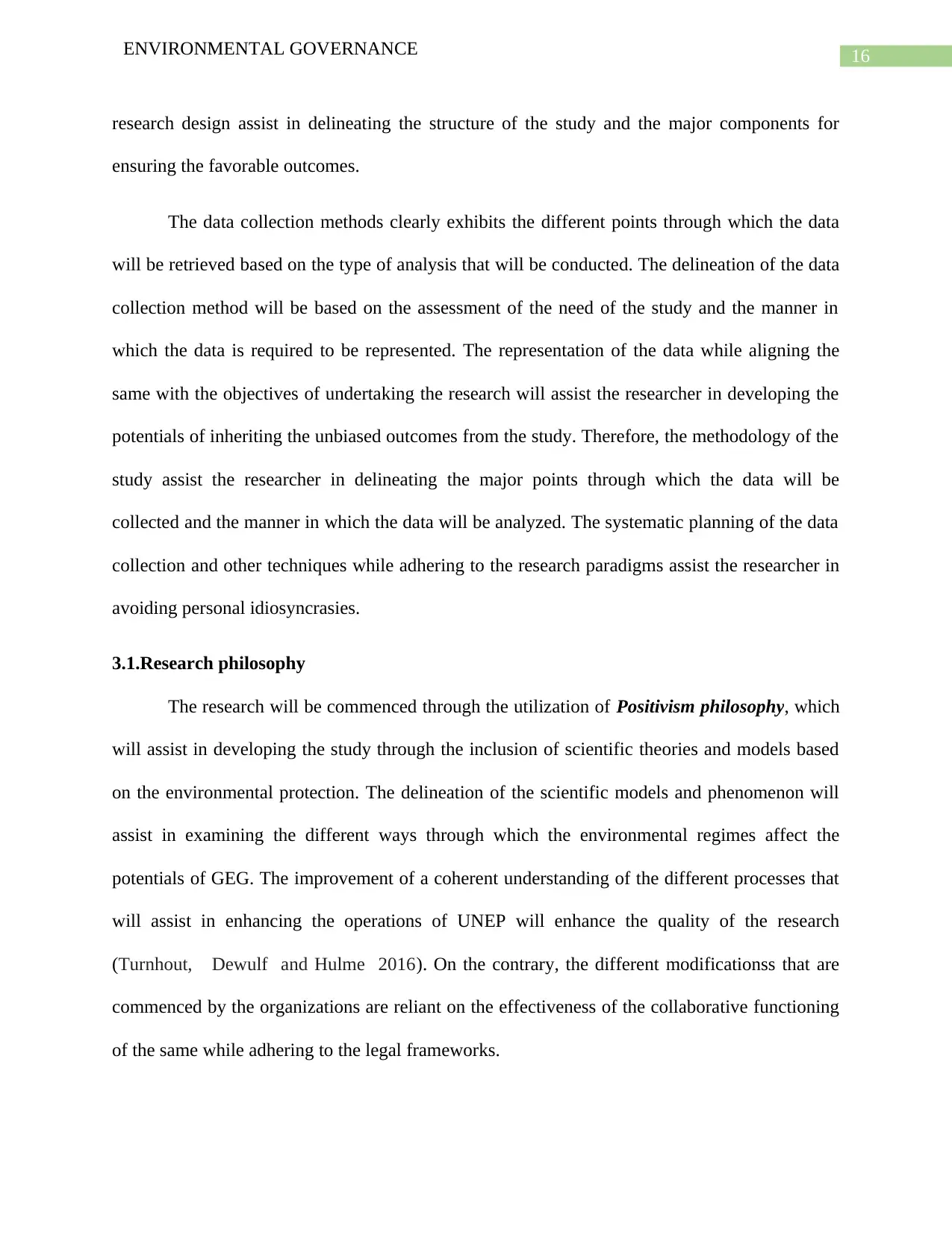
16ENVIRONMENTAL GOVERNANCE
research design assist in delineating the structure of the study and the major components for
ensuring the favorable outcomes.
The data collection methods clearly exhibits the different points through which the data
will be retrieved based on the type of analysis that will be conducted. The delineation of the data
collection method will be based on the assessment of the need of the study and the manner in
which the data is required to be represented. The representation of the data while aligning the
same with the objectives of undertaking the research will assist the researcher in developing the
potentials of inheriting the unbiased outcomes from the study. Therefore, the methodology of the
study assist the researcher in delineating the major points through which the data will be
collected and the manner in which the data will be analyzed. The systematic planning of the data
collection and other techniques while adhering to the research paradigms assist the researcher in
avoiding personal idiosyncrasies.
3.1.Research philosophy
The research will be commenced through the utilization of Positivism philosophy, which
will assist in developing the study through the inclusion of scientific theories and models based
on the environmental protection. The delineation of the scientific models and phenomenon will
assist in examining the different ways through which the environmental regimes affect the
potentials of GEG. The improvement of a coherent understanding of the different processes that
will assist in enhancing the operations of UNEP will enhance the quality of the research
(Turnhout, Dewulf and Hulme 2016). On the contrary, the different modificationss that are
commenced by the organizations are reliant on the effectiveness of the collaborative functioning
of the same while adhering to the legal frameworks.
research design assist in delineating the structure of the study and the major components for
ensuring the favorable outcomes.
The data collection methods clearly exhibits the different points through which the data
will be retrieved based on the type of analysis that will be conducted. The delineation of the data
collection method will be based on the assessment of the need of the study and the manner in
which the data is required to be represented. The representation of the data while aligning the
same with the objectives of undertaking the research will assist the researcher in developing the
potentials of inheriting the unbiased outcomes from the study. Therefore, the methodology of the
study assist the researcher in delineating the major points through which the data will be
collected and the manner in which the data will be analyzed. The systematic planning of the data
collection and other techniques while adhering to the research paradigms assist the researcher in
avoiding personal idiosyncrasies.
3.1.Research philosophy
The research will be commenced through the utilization of Positivism philosophy, which
will assist in developing the study through the inclusion of scientific theories and models based
on the environmental protection. The delineation of the scientific models and phenomenon will
assist in examining the different ways through which the environmental regimes affect the
potentials of GEG. The improvement of a coherent understanding of the different processes that
will assist in enhancing the operations of UNEP will enhance the quality of the research
(Turnhout, Dewulf and Hulme 2016). On the contrary, the different modificationss that are
commenced by the organizations are reliant on the effectiveness of the collaborative functioning
of the same while adhering to the legal frameworks.
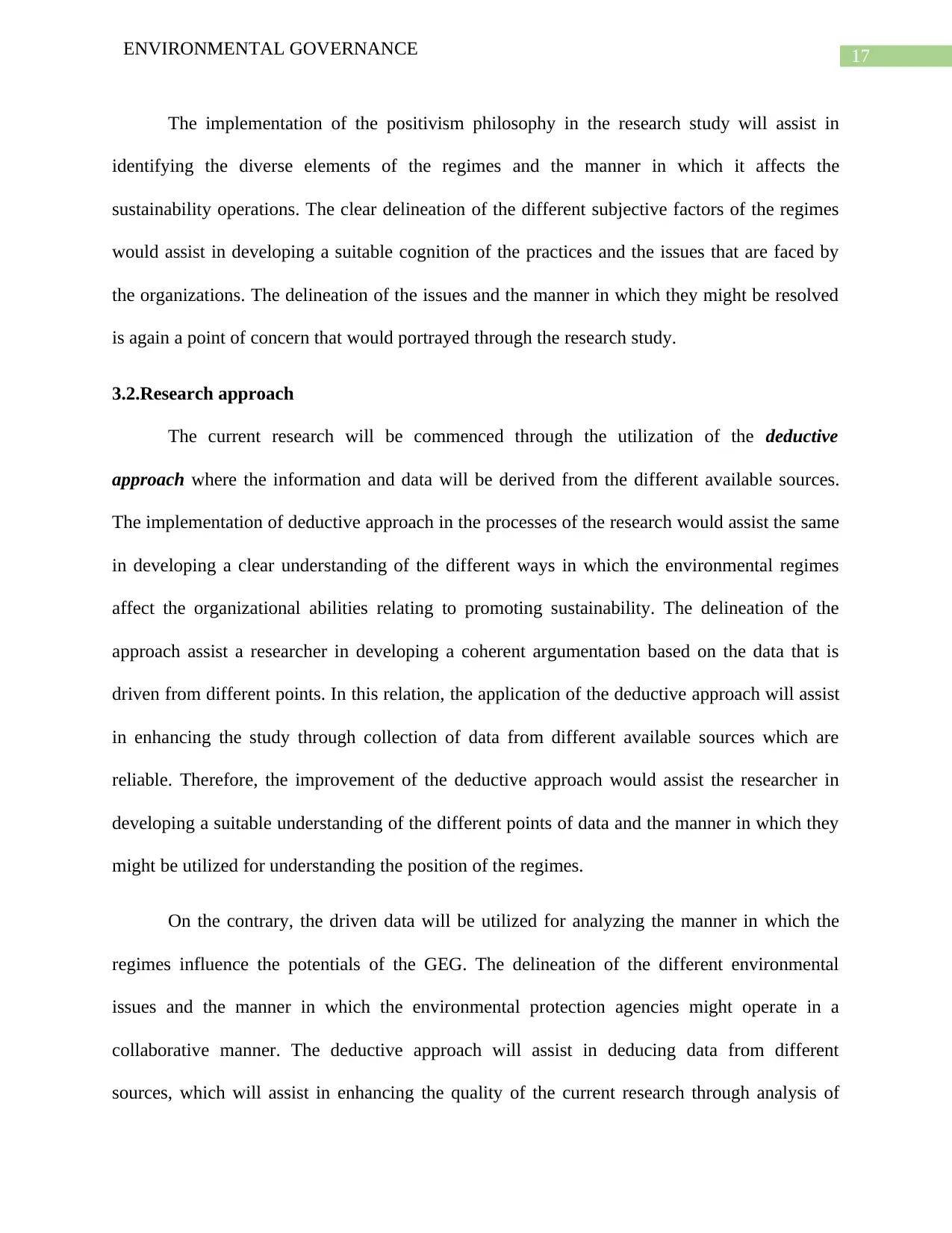
17ENVIRONMENTAL GOVERNANCE
The implementation of the positivism philosophy in the research study will assist in
identifying the diverse elements of the regimes and the manner in which it affects the
sustainability operations. The clear delineation of the different subjective factors of the regimes
would assist in developing a suitable cognition of the practices and the issues that are faced by
the organizations. The delineation of the issues and the manner in which they might be resolved
is again a point of concern that would portrayed through the research study.
3.2.Research approach
The current research will be commenced through the utilization of the deductive
approach where the information and data will be derived from the different available sources.
The implementation of deductive approach in the processes of the research would assist the same
in developing a clear understanding of the different ways in which the environmental regimes
affect the organizational abilities relating to promoting sustainability. The delineation of the
approach assist a researcher in developing a coherent argumentation based on the data that is
driven from different points. In this relation, the application of the deductive approach will assist
in enhancing the study through collection of data from different available sources which are
reliable. Therefore, the improvement of the deductive approach would assist the researcher in
developing a suitable understanding of the different points of data and the manner in which they
might be utilized for understanding the position of the regimes.
On the contrary, the driven data will be utilized for analyzing the manner in which the
regimes influence the potentials of the GEG. The delineation of the different environmental
issues and the manner in which the environmental protection agencies might operate in a
collaborative manner. The deductive approach will assist in deducing data from different
sources, which will assist in enhancing the quality of the current research through analysis of
The implementation of the positivism philosophy in the research study will assist in
identifying the diverse elements of the regimes and the manner in which it affects the
sustainability operations. The clear delineation of the different subjective factors of the regimes
would assist in developing a suitable cognition of the practices and the issues that are faced by
the organizations. The delineation of the issues and the manner in which they might be resolved
is again a point of concern that would portrayed through the research study.
3.2.Research approach
The current research will be commenced through the utilization of the deductive
approach where the information and data will be derived from the different available sources.
The implementation of deductive approach in the processes of the research would assist the same
in developing a clear understanding of the different ways in which the environmental regimes
affect the organizational abilities relating to promoting sustainability. The delineation of the
approach assist a researcher in developing a coherent argumentation based on the data that is
driven from different points. In this relation, the application of the deductive approach will assist
in enhancing the study through collection of data from different available sources which are
reliable. Therefore, the improvement of the deductive approach would assist the researcher in
developing a suitable understanding of the different points of data and the manner in which they
might be utilized for understanding the position of the regimes.
On the contrary, the driven data will be utilized for analyzing the manner in which the
regimes influence the potentials of the GEG. The delineation of the different environmental
issues and the manner in which the environmental protection agencies might operate in a
collaborative manner. The deductive approach will assist in deducing data from different
sources, which will assist in enhancing the quality of the current research through analysis of
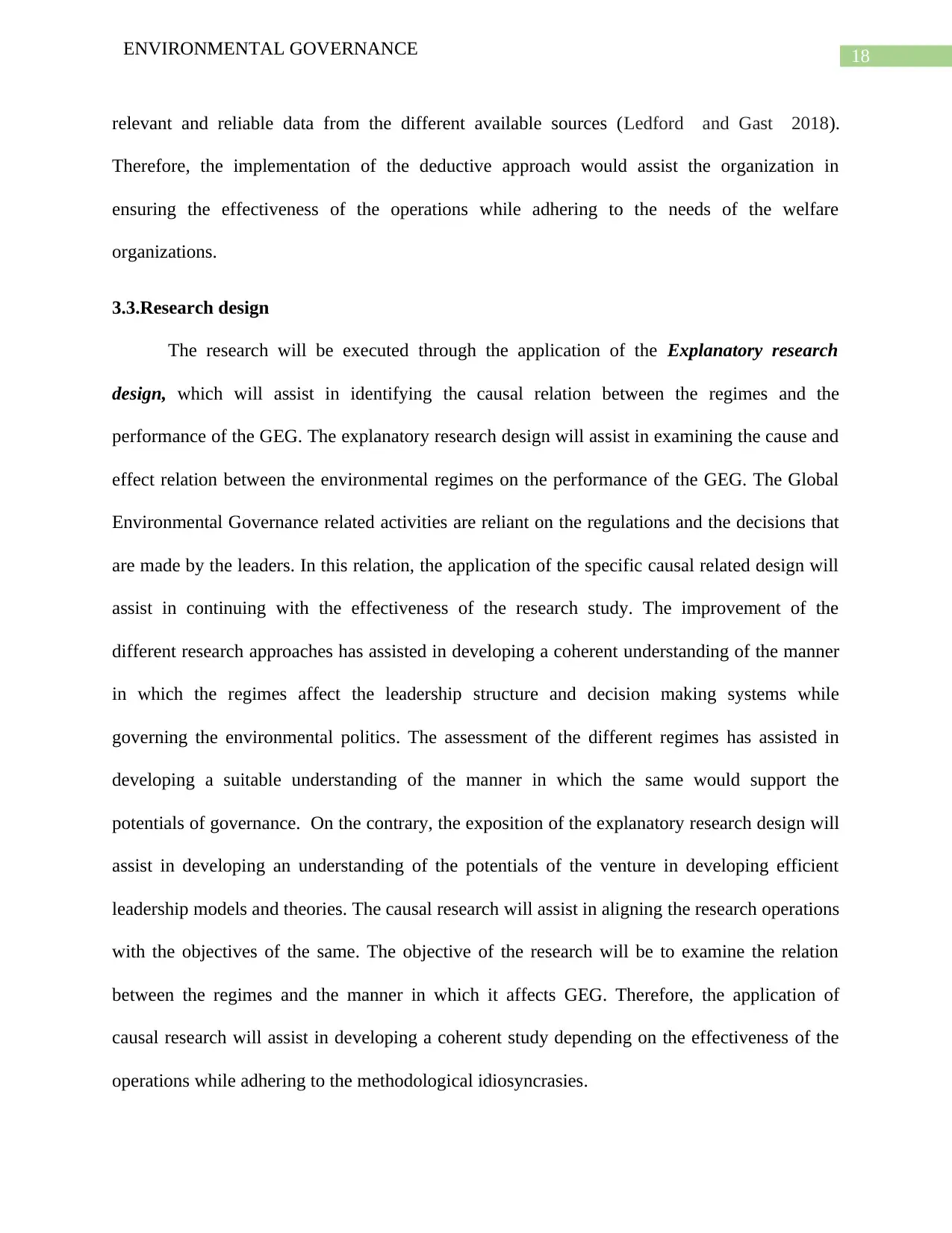
18ENVIRONMENTAL GOVERNANCE
relevant and reliable data from the different available sources (Ledford and Gast 2018).
Therefore, the implementation of the deductive approach would assist the organization in
ensuring the effectiveness of the operations while adhering to the needs of the welfare
organizations.
3.3.Research design
The research will be executed through the application of the Explanatory research
design, which will assist in identifying the causal relation between the regimes and the
performance of the GEG. The explanatory research design will assist in examining the cause and
effect relation between the environmental regimes on the performance of the GEG. The Global
Environmental Governance related activities are reliant on the regulations and the decisions that
are made by the leaders. In this relation, the application of the specific causal related design will
assist in continuing with the effectiveness of the research study. The improvement of the
different research approaches has assisted in developing a coherent understanding of the manner
in which the regimes affect the leadership structure and decision making systems while
governing the environmental politics. The assessment of the different regimes has assisted in
developing a suitable understanding of the manner in which the same would support the
potentials of governance. On the contrary, the exposition of the explanatory research design will
assist in developing an understanding of the potentials of the venture in developing efficient
leadership models and theories. The causal research will assist in aligning the research operations
with the objectives of the same. The objective of the research will be to examine the relation
between the regimes and the manner in which it affects GEG. Therefore, the application of
causal research will assist in developing a coherent study depending on the effectiveness of the
operations while adhering to the methodological idiosyncrasies.
relevant and reliable data from the different available sources (Ledford and Gast 2018).
Therefore, the implementation of the deductive approach would assist the organization in
ensuring the effectiveness of the operations while adhering to the needs of the welfare
organizations.
3.3.Research design
The research will be executed through the application of the Explanatory research
design, which will assist in identifying the causal relation between the regimes and the
performance of the GEG. The explanatory research design will assist in examining the cause and
effect relation between the environmental regimes on the performance of the GEG. The Global
Environmental Governance related activities are reliant on the regulations and the decisions that
are made by the leaders. In this relation, the application of the specific causal related design will
assist in continuing with the effectiveness of the research study. The improvement of the
different research approaches has assisted in developing a coherent understanding of the manner
in which the regimes affect the leadership structure and decision making systems while
governing the environmental politics. The assessment of the different regimes has assisted in
developing a suitable understanding of the manner in which the same would support the
potentials of governance. On the contrary, the exposition of the explanatory research design will
assist in developing an understanding of the potentials of the venture in developing efficient
leadership models and theories. The causal research will assist in aligning the research operations
with the objectives of the same. The objective of the research will be to examine the relation
between the regimes and the manner in which it affects GEG. Therefore, the application of
causal research will assist in developing a coherent study depending on the effectiveness of the
operations while adhering to the methodological idiosyncrasies.
Paraphrase This Document
Need a fresh take? Get an instant paraphrase of this document with our AI Paraphraser
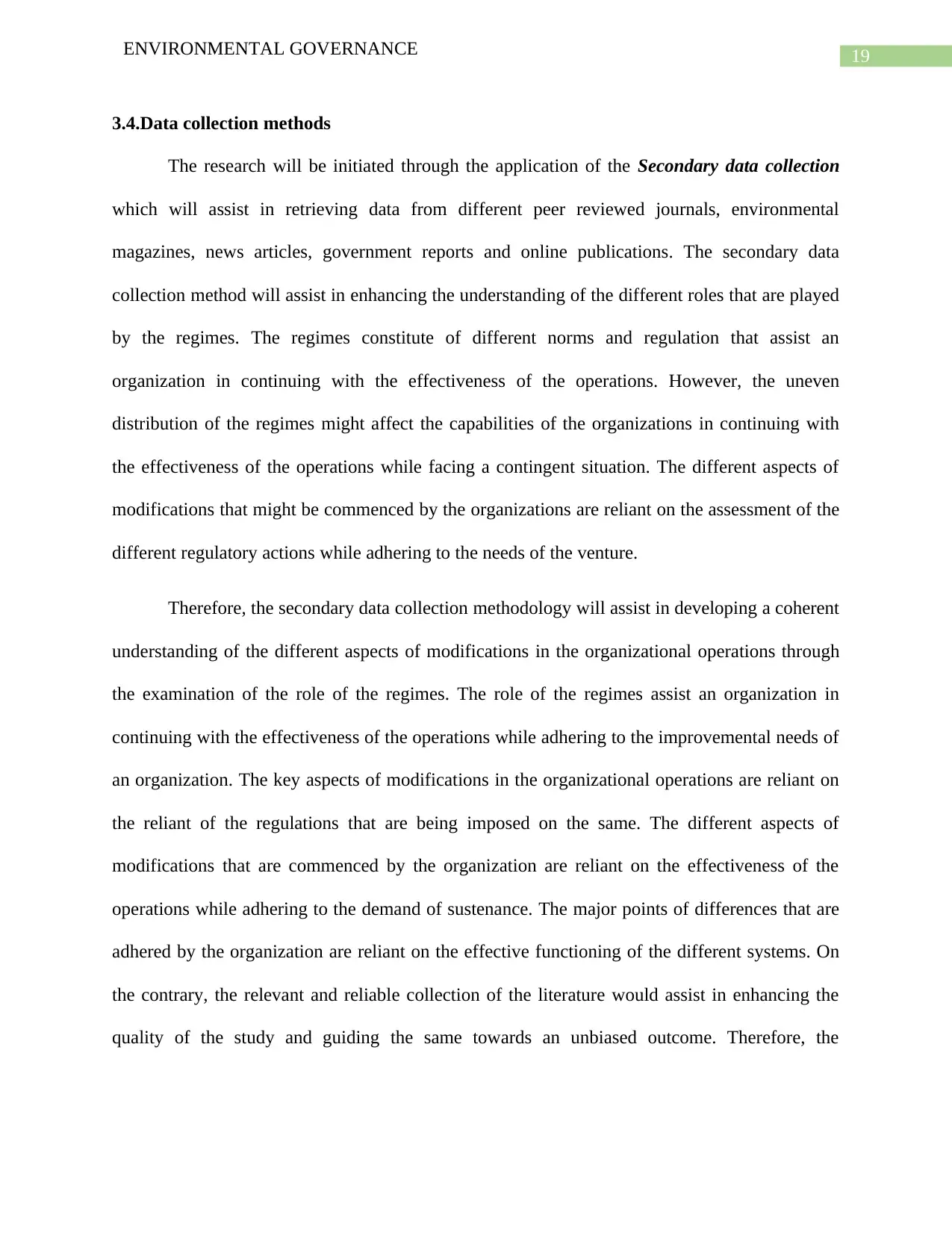
19ENVIRONMENTAL GOVERNANCE
3.4.Data collection methods
The research will be initiated through the application of the Secondary data collection
which will assist in retrieving data from different peer reviewed journals, environmental
magazines, news articles, government reports and online publications. The secondary data
collection method will assist in enhancing the understanding of the different roles that are played
by the regimes. The regimes constitute of different norms and regulation that assist an
organization in continuing with the effectiveness of the operations. However, the uneven
distribution of the regimes might affect the capabilities of the organizations in continuing with
the effectiveness of the operations while facing a contingent situation. The different aspects of
modifications that might be commenced by the organizations are reliant on the assessment of the
different regulatory actions while adhering to the needs of the venture.
Therefore, the secondary data collection methodology will assist in developing a coherent
understanding of the different aspects of modifications in the organizational operations through
the examination of the role of the regimes. The role of the regimes assist an organization in
continuing with the effectiveness of the operations while adhering to the improvemental needs of
an organization. The key aspects of modifications in the organizational operations are reliant on
the reliant of the regulations that are being imposed on the same. The different aspects of
modifications that are commenced by the organization are reliant on the effectiveness of the
operations while adhering to the demand of sustenance. The major points of differences that are
adhered by the organization are reliant on the effective functioning of the different systems. On
the contrary, the relevant and reliable collection of the literature would assist in enhancing the
quality of the study and guiding the same towards an unbiased outcome. Therefore, the
3.4.Data collection methods
The research will be initiated through the application of the Secondary data collection
which will assist in retrieving data from different peer reviewed journals, environmental
magazines, news articles, government reports and online publications. The secondary data
collection method will assist in enhancing the understanding of the different roles that are played
by the regimes. The regimes constitute of different norms and regulation that assist an
organization in continuing with the effectiveness of the operations. However, the uneven
distribution of the regimes might affect the capabilities of the organizations in continuing with
the effectiveness of the operations while facing a contingent situation. The different aspects of
modifications that might be commenced by the organizations are reliant on the assessment of the
different regulatory actions while adhering to the needs of the venture.
Therefore, the secondary data collection methodology will assist in developing a coherent
understanding of the different aspects of modifications in the organizational operations through
the examination of the role of the regimes. The role of the regimes assist an organization in
continuing with the effectiveness of the operations while adhering to the improvemental needs of
an organization. The key aspects of modifications in the organizational operations are reliant on
the reliant of the regulations that are being imposed on the same. The different aspects of
modifications that are commenced by the organization are reliant on the effectiveness of the
operations while adhering to the demand of sustenance. The major points of differences that are
adhered by the organization are reliant on the effective functioning of the different systems. On
the contrary, the relevant and reliable collection of the literature would assist in enhancing the
quality of the study and guiding the same towards an unbiased outcome. Therefore, the
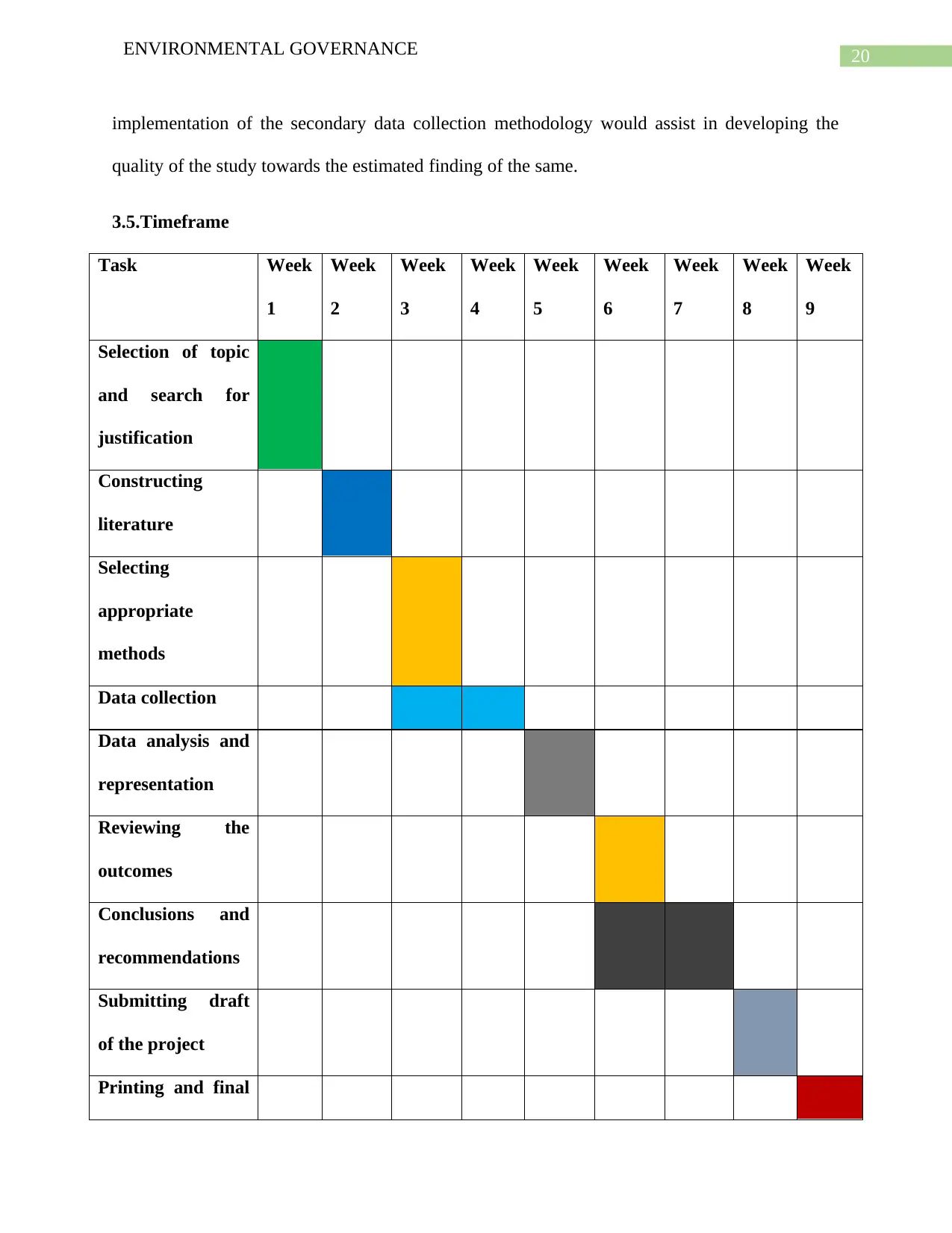
20ENVIRONMENTAL GOVERNANCE
implementation of the secondary data collection methodology would assist in developing the
quality of the study towards the estimated finding of the same.
3.5.Timeframe
Task Week
1
Week
2
Week
3
Week
4
Week
5
Week
6
Week
7
Week
8
Week
9
Selection of topic
and search for
justification
Constructing
literature
Selecting
appropriate
methods
Data collection
Data analysis and
representation
Reviewing the
outcomes
Conclusions and
recommendations
Submitting draft
of the project
Printing and final
implementation of the secondary data collection methodology would assist in developing the
quality of the study towards the estimated finding of the same.
3.5.Timeframe
Task Week
1
Week
2
Week
3
Week
4
Week
5
Week
6
Week
7
Week
8
Week
9
Selection of topic
and search for
justification
Constructing
literature
Selecting
appropriate
methods
Data collection
Data analysis and
representation
Reviewing the
outcomes
Conclusions and
recommendations
Submitting draft
of the project
Printing and final
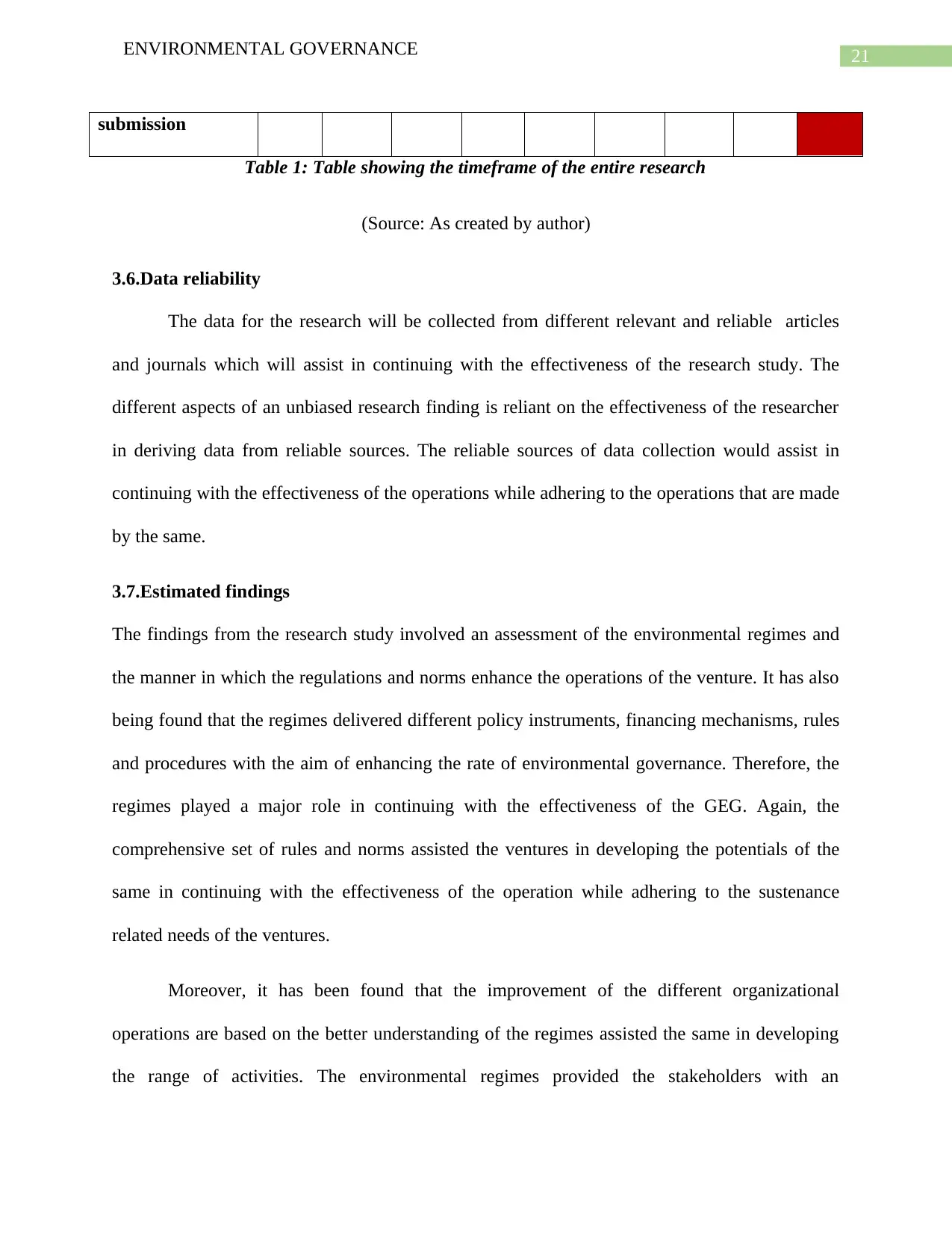
21ENVIRONMENTAL GOVERNANCE
submission
Table 1: Table showing the timeframe of the entire research
(Source: As created by author)
3.6.Data reliability
The data for the research will be collected from different relevant and reliable articles
and journals which will assist in continuing with the effectiveness of the research study. The
different aspects of an unbiased research finding is reliant on the effectiveness of the researcher
in deriving data from reliable sources. The reliable sources of data collection would assist in
continuing with the effectiveness of the operations while adhering to the operations that are made
by the same.
3.7.Estimated findings
The findings from the research study involved an assessment of the environmental regimes and
the manner in which the regulations and norms enhance the operations of the venture. It has also
being found that the regimes delivered different policy instruments, financing mechanisms, rules
and procedures with the aim of enhancing the rate of environmental governance. Therefore, the
regimes played a major role in continuing with the effectiveness of the GEG. Again, the
comprehensive set of rules and norms assisted the ventures in developing the potentials of the
same in continuing with the effectiveness of the operation while adhering to the sustenance
related needs of the ventures.
Moreover, it has been found that the improvement of the different organizational
operations are based on the better understanding of the regimes assisted the same in developing
the range of activities. The environmental regimes provided the stakeholders with an
submission
Table 1: Table showing the timeframe of the entire research
(Source: As created by author)
3.6.Data reliability
The data for the research will be collected from different relevant and reliable articles
and journals which will assist in continuing with the effectiveness of the research study. The
different aspects of an unbiased research finding is reliant on the effectiveness of the researcher
in deriving data from reliable sources. The reliable sources of data collection would assist in
continuing with the effectiveness of the operations while adhering to the operations that are made
by the same.
3.7.Estimated findings
The findings from the research study involved an assessment of the environmental regimes and
the manner in which the regulations and norms enhance the operations of the venture. It has also
being found that the regimes delivered different policy instruments, financing mechanisms, rules
and procedures with the aim of enhancing the rate of environmental governance. Therefore, the
regimes played a major role in continuing with the effectiveness of the GEG. Again, the
comprehensive set of rules and norms assisted the ventures in developing the potentials of the
same in continuing with the effectiveness of the operation while adhering to the sustenance
related needs of the ventures.
Moreover, it has been found that the improvement of the different organizational
operations are based on the better understanding of the regimes assisted the same in developing
the range of activities. The environmental regimes provided the stakeholders with an
Secure Best Marks with AI Grader
Need help grading? Try our AI Grader for instant feedback on your assignments.
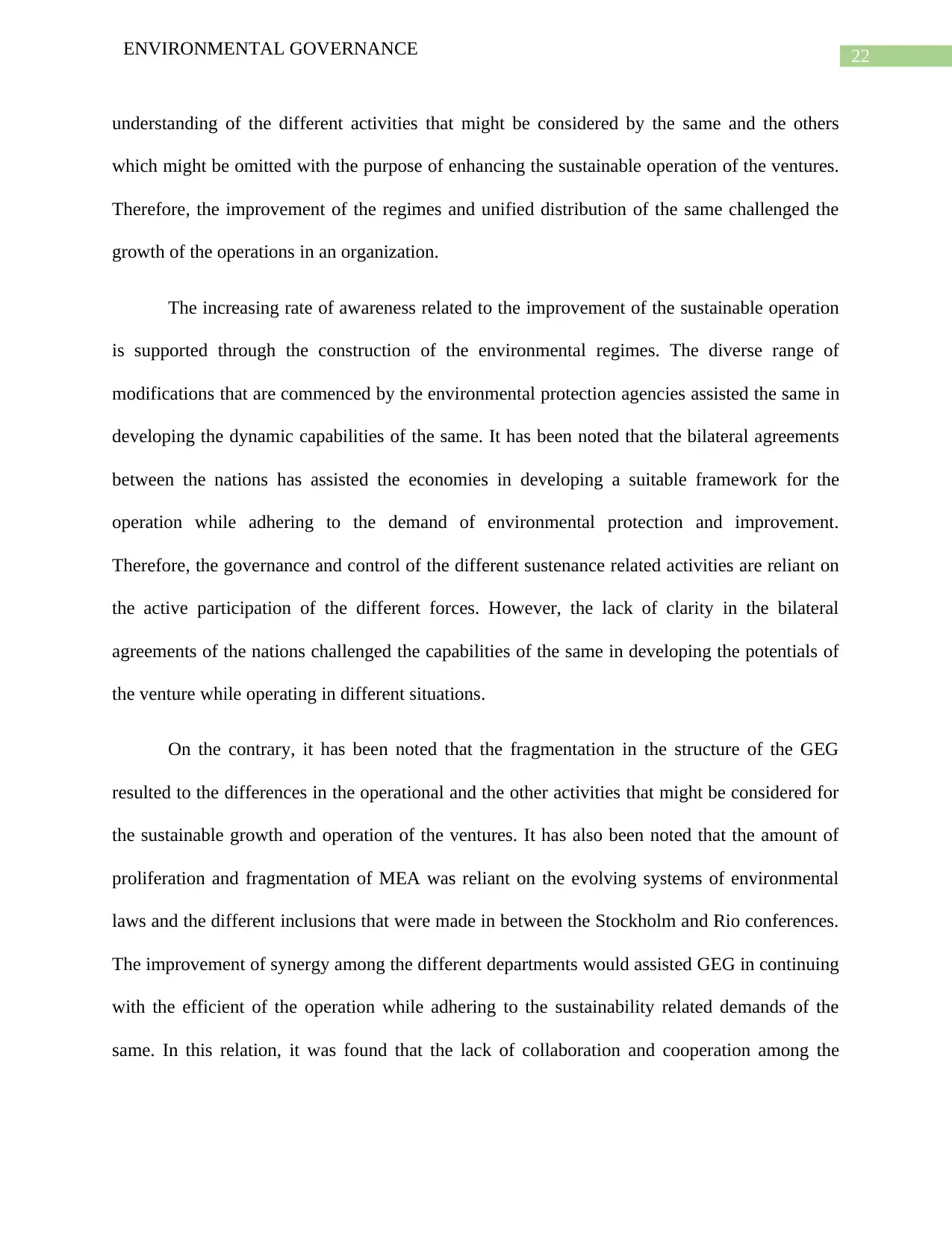
22ENVIRONMENTAL GOVERNANCE
understanding of the different activities that might be considered by the same and the others
which might be omitted with the purpose of enhancing the sustainable operation of the ventures.
Therefore, the improvement of the regimes and unified distribution of the same challenged the
growth of the operations in an organization.
The increasing rate of awareness related to the improvement of the sustainable operation
is supported through the construction of the environmental regimes. The diverse range of
modifications that are commenced by the environmental protection agencies assisted the same in
developing the dynamic capabilities of the same. It has been noted that the bilateral agreements
between the nations has assisted the economies in developing a suitable framework for the
operation while adhering to the demand of environmental protection and improvement.
Therefore, the governance and control of the different sustenance related activities are reliant on
the active participation of the different forces. However, the lack of clarity in the bilateral
agreements of the nations challenged the capabilities of the same in developing the potentials of
the venture while operating in different situations.
On the contrary, it has been noted that the fragmentation in the structure of the GEG
resulted to the differences in the operational and the other activities that might be considered for
the sustainable growth and operation of the ventures. It has also been noted that the amount of
proliferation and fragmentation of MEA was reliant on the evolving systems of environmental
laws and the different inclusions that were made in between the Stockholm and Rio conferences.
The improvement of synergy among the different departments would assisted GEG in continuing
with the efficient of the operation while adhering to the sustainability related demands of the
same. In this relation, it was found that the lack of collaboration and cooperation among the
understanding of the different activities that might be considered by the same and the others
which might be omitted with the purpose of enhancing the sustainable operation of the ventures.
Therefore, the improvement of the regimes and unified distribution of the same challenged the
growth of the operations in an organization.
The increasing rate of awareness related to the improvement of the sustainable operation
is supported through the construction of the environmental regimes. The diverse range of
modifications that are commenced by the environmental protection agencies assisted the same in
developing the dynamic capabilities of the same. It has been noted that the bilateral agreements
between the nations has assisted the economies in developing a suitable framework for the
operation while adhering to the demand of environmental protection and improvement.
Therefore, the governance and control of the different sustenance related activities are reliant on
the active participation of the different forces. However, the lack of clarity in the bilateral
agreements of the nations challenged the capabilities of the same in developing the potentials of
the venture while operating in different situations.
On the contrary, it has been noted that the fragmentation in the structure of the GEG
resulted to the differences in the operational and the other activities that might be considered for
the sustainable growth and operation of the ventures. It has also been noted that the amount of
proliferation and fragmentation of MEA was reliant on the evolving systems of environmental
laws and the different inclusions that were made in between the Stockholm and Rio conferences.
The improvement of synergy among the different departments would assisted GEG in continuing
with the efficient of the operation while adhering to the sustainability related demands of the
same. In this relation, it was found that the lack of collaboration and cooperation among the
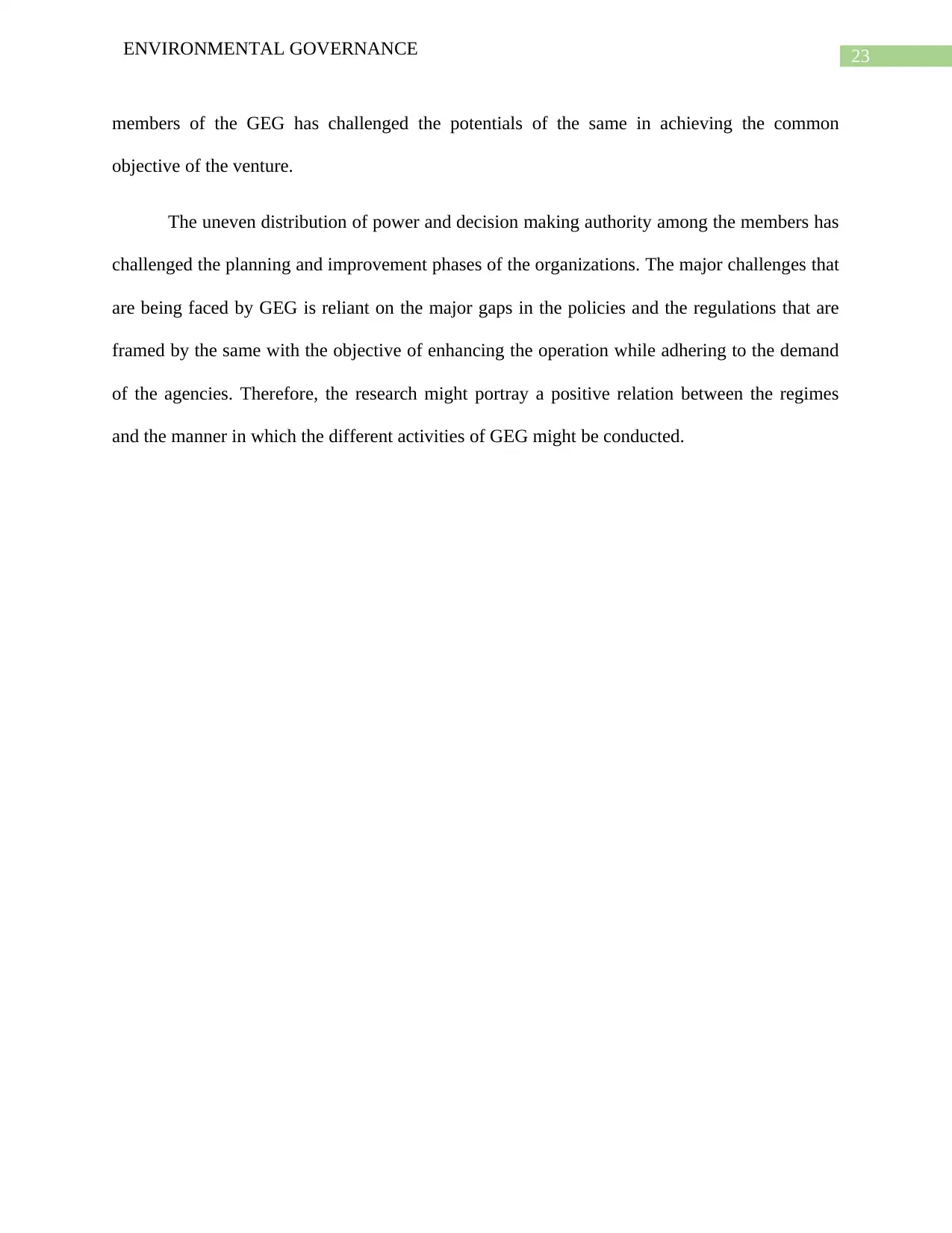
23ENVIRONMENTAL GOVERNANCE
members of the GEG has challenged the potentials of the same in achieving the common
objective of the venture.
The uneven distribution of power and decision making authority among the members has
challenged the planning and improvement phases of the organizations. The major challenges that
are being faced by GEG is reliant on the major gaps in the policies and the regulations that are
framed by the same with the objective of enhancing the operation while adhering to the demand
of the agencies. Therefore, the research might portray a positive relation between the regimes
and the manner in which the different activities of GEG might be conducted.
members of the GEG has challenged the potentials of the same in achieving the common
objective of the venture.
The uneven distribution of power and decision making authority among the members has
challenged the planning and improvement phases of the organizations. The major challenges that
are being faced by GEG is reliant on the major gaps in the policies and the regulations that are
framed by the same with the objective of enhancing the operation while adhering to the demand
of the agencies. Therefore, the research might portray a positive relation between the regimes
and the manner in which the different activities of GEG might be conducted.
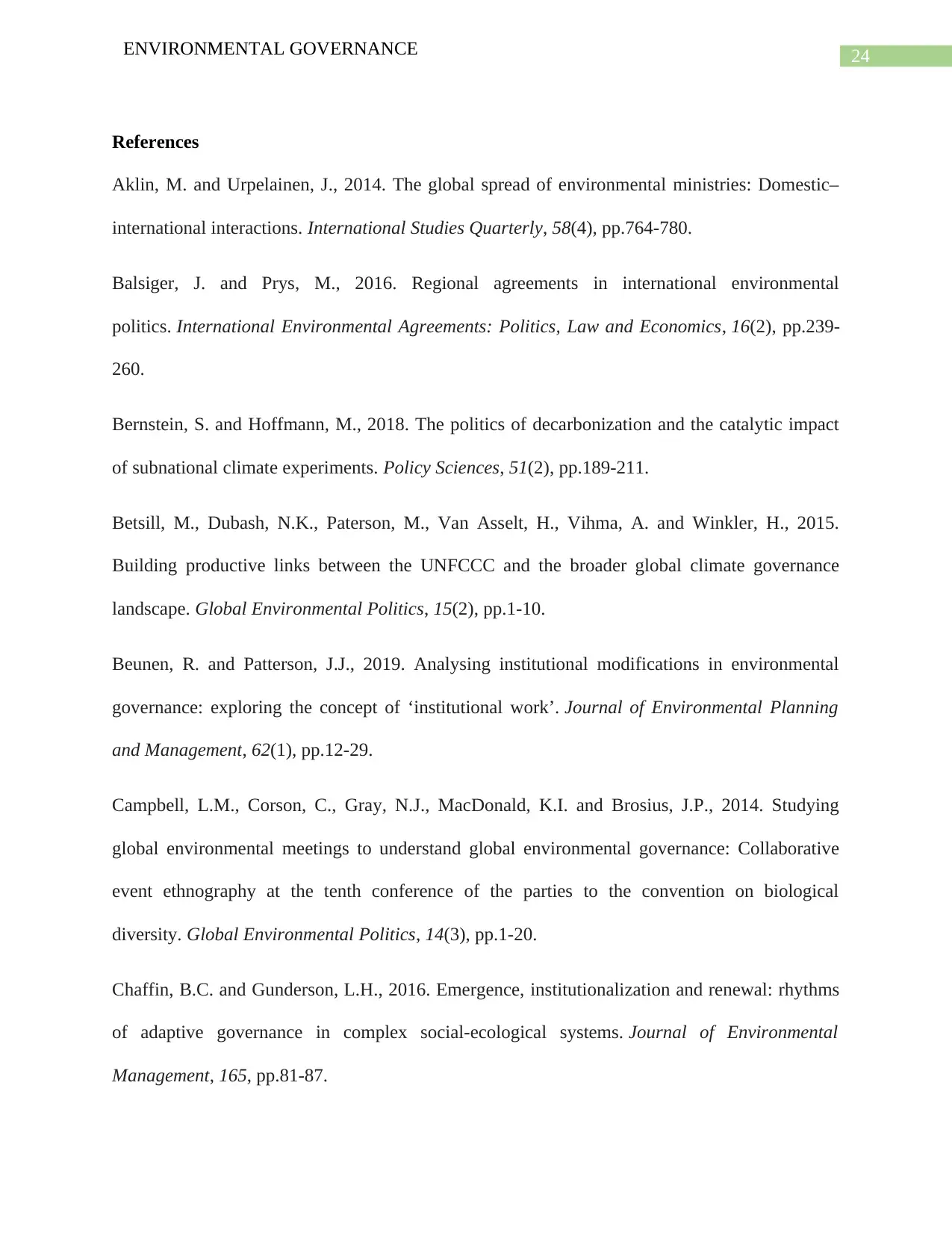
24ENVIRONMENTAL GOVERNANCE
References
Aklin, M. and Urpelainen, J., 2014. The global spread of environmental ministries: Domestic–
international interactions. International Studies Quarterly, 58(4), pp.764-780.
Balsiger, J. and Prys, M., 2016. Regional agreements in international environmental
politics. International Environmental Agreements: Politics, Law and Economics, 16(2), pp.239-
260.
Bernstein, S. and Hoffmann, M., 2018. The politics of decarbonization and the catalytic impact
of subnational climate experiments. Policy Sciences, 51(2), pp.189-211.
Betsill, M., Dubash, N.K., Paterson, M., Van Asselt, H., Vihma, A. and Winkler, H., 2015.
Building productive links between the UNFCCC and the broader global climate governance
landscape. Global Environmental Politics, 15(2), pp.1-10.
Beunen, R. and Patterson, J.J., 2019. Analysing institutional modifications in environmental
governance: exploring the concept of ‘institutional work’. Journal of Environmental Planning
and Management, 62(1), pp.12-29.
Campbell, L.M., Corson, C., Gray, N.J., MacDonald, K.I. and Brosius, J.P., 2014. Studying
global environmental meetings to understand global environmental governance: Collaborative
event ethnography at the tenth conference of the parties to the convention on biological
diversity. Global Environmental Politics, 14(3), pp.1-20.
Chaffin, B.C. and Gunderson, L.H., 2016. Emergence, institutionalization and renewal: rhythms
of adaptive governance in complex social-ecological systems. Journal of Environmental
Management, 165, pp.81-87.
References
Aklin, M. and Urpelainen, J., 2014. The global spread of environmental ministries: Domestic–
international interactions. International Studies Quarterly, 58(4), pp.764-780.
Balsiger, J. and Prys, M., 2016. Regional agreements in international environmental
politics. International Environmental Agreements: Politics, Law and Economics, 16(2), pp.239-
260.
Bernstein, S. and Hoffmann, M., 2018. The politics of decarbonization and the catalytic impact
of subnational climate experiments. Policy Sciences, 51(2), pp.189-211.
Betsill, M., Dubash, N.K., Paterson, M., Van Asselt, H., Vihma, A. and Winkler, H., 2015.
Building productive links between the UNFCCC and the broader global climate governance
landscape. Global Environmental Politics, 15(2), pp.1-10.
Beunen, R. and Patterson, J.J., 2019. Analysing institutional modifications in environmental
governance: exploring the concept of ‘institutional work’. Journal of Environmental Planning
and Management, 62(1), pp.12-29.
Campbell, L.M., Corson, C., Gray, N.J., MacDonald, K.I. and Brosius, J.P., 2014. Studying
global environmental meetings to understand global environmental governance: Collaborative
event ethnography at the tenth conference of the parties to the convention on biological
diversity. Global Environmental Politics, 14(3), pp.1-20.
Chaffin, B.C. and Gunderson, L.H., 2016. Emergence, institutionalization and renewal: rhythms
of adaptive governance in complex social-ecological systems. Journal of Environmental
Management, 165, pp.81-87.
Paraphrase This Document
Need a fresh take? Get an instant paraphrase of this document with our AI Paraphraser
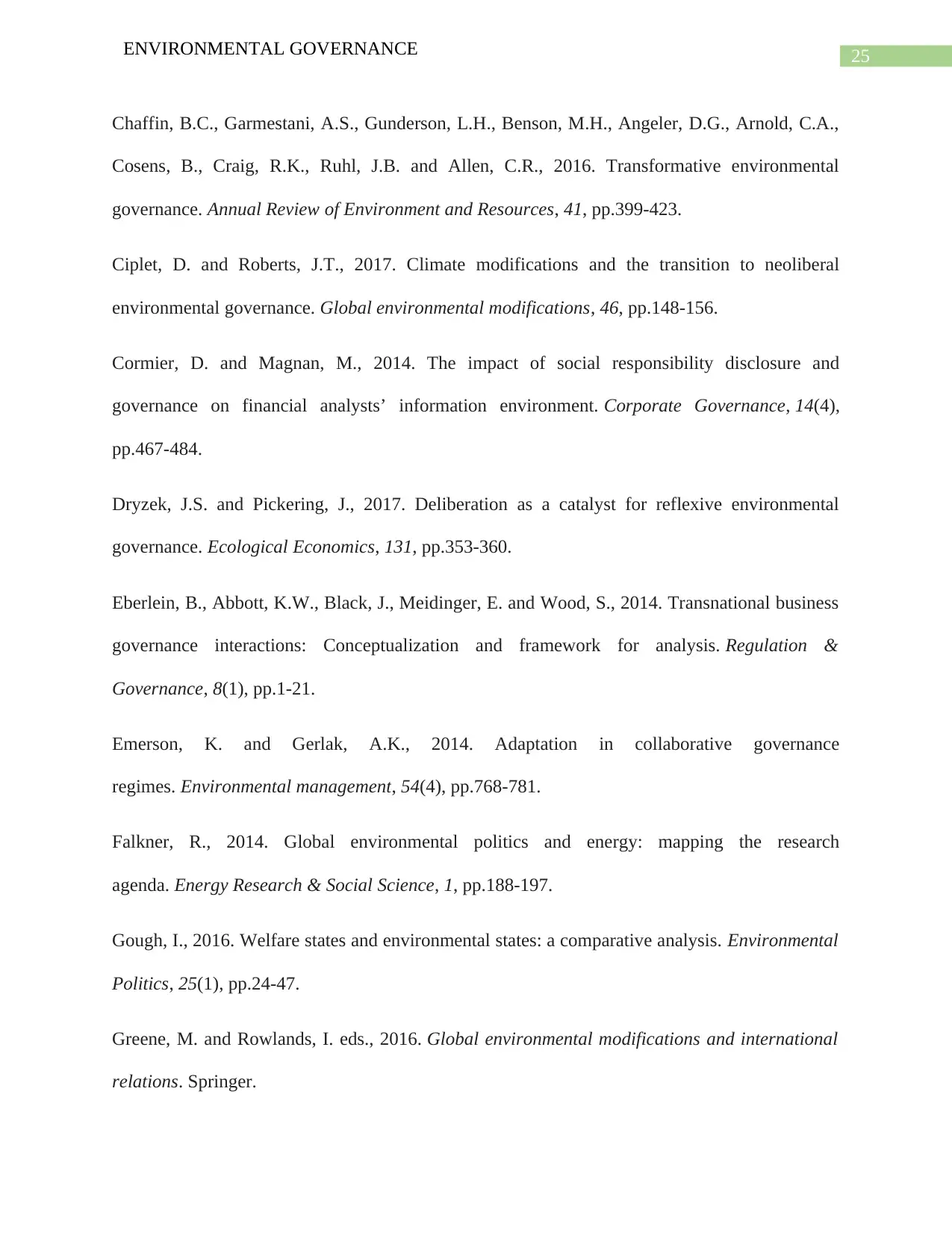
25ENVIRONMENTAL GOVERNANCE
Chaffin, B.C., Garmestani, A.S., Gunderson, L.H., Benson, M.H., Angeler, D.G., Arnold, C.A.,
Cosens, B., Craig, R.K., Ruhl, J.B. and Allen, C.R., 2016. Transformative environmental
governance. Annual Review of Environment and Resources, 41, pp.399-423.
Ciplet, D. and Roberts, J.T., 2017. Climate modifications and the transition to neoliberal
environmental governance. Global environmental modifications, 46, pp.148-156.
Cormier, D. and Magnan, M., 2014. The impact of social responsibility disclosure and
governance on financial analysts’ information environment. Corporate Governance, 14(4),
pp.467-484.
Dryzek, J.S. and Pickering, J., 2017. Deliberation as a catalyst for reflexive environmental
governance. Ecological Economics, 131, pp.353-360.
Eberlein, B., Abbott, K.W., Black, J., Meidinger, E. and Wood, S., 2014. Transnational business
governance interactions: Conceptualization and framework for analysis. Regulation &
Governance, 8(1), pp.1-21.
Emerson, K. and Gerlak, A.K., 2014. Adaptation in collaborative governance
regimes. Environmental management, 54(4), pp.768-781.
Falkner, R., 2014. Global environmental politics and energy: mapping the research
agenda. Energy Research & Social Science, 1, pp.188-197.
Gough, I., 2016. Welfare states and environmental states: a comparative analysis. Environmental
Politics, 25(1), pp.24-47.
Greene, M. and Rowlands, I. eds., 2016. Global environmental modifications and international
relations. Springer.
Chaffin, B.C., Garmestani, A.S., Gunderson, L.H., Benson, M.H., Angeler, D.G., Arnold, C.A.,
Cosens, B., Craig, R.K., Ruhl, J.B. and Allen, C.R., 2016. Transformative environmental
governance. Annual Review of Environment and Resources, 41, pp.399-423.
Ciplet, D. and Roberts, J.T., 2017. Climate modifications and the transition to neoliberal
environmental governance. Global environmental modifications, 46, pp.148-156.
Cormier, D. and Magnan, M., 2014. The impact of social responsibility disclosure and
governance on financial analysts’ information environment. Corporate Governance, 14(4),
pp.467-484.
Dryzek, J.S. and Pickering, J., 2017. Deliberation as a catalyst for reflexive environmental
governance. Ecological Economics, 131, pp.353-360.
Eberlein, B., Abbott, K.W., Black, J., Meidinger, E. and Wood, S., 2014. Transnational business
governance interactions: Conceptualization and framework for analysis. Regulation &
Governance, 8(1), pp.1-21.
Emerson, K. and Gerlak, A.K., 2014. Adaptation in collaborative governance
regimes. Environmental management, 54(4), pp.768-781.
Falkner, R., 2014. Global environmental politics and energy: mapping the research
agenda. Energy Research & Social Science, 1, pp.188-197.
Gough, I., 2016. Welfare states and environmental states: a comparative analysis. Environmental
Politics, 25(1), pp.24-47.
Greene, M. and Rowlands, I. eds., 2016. Global environmental modifications and international
relations. Springer.
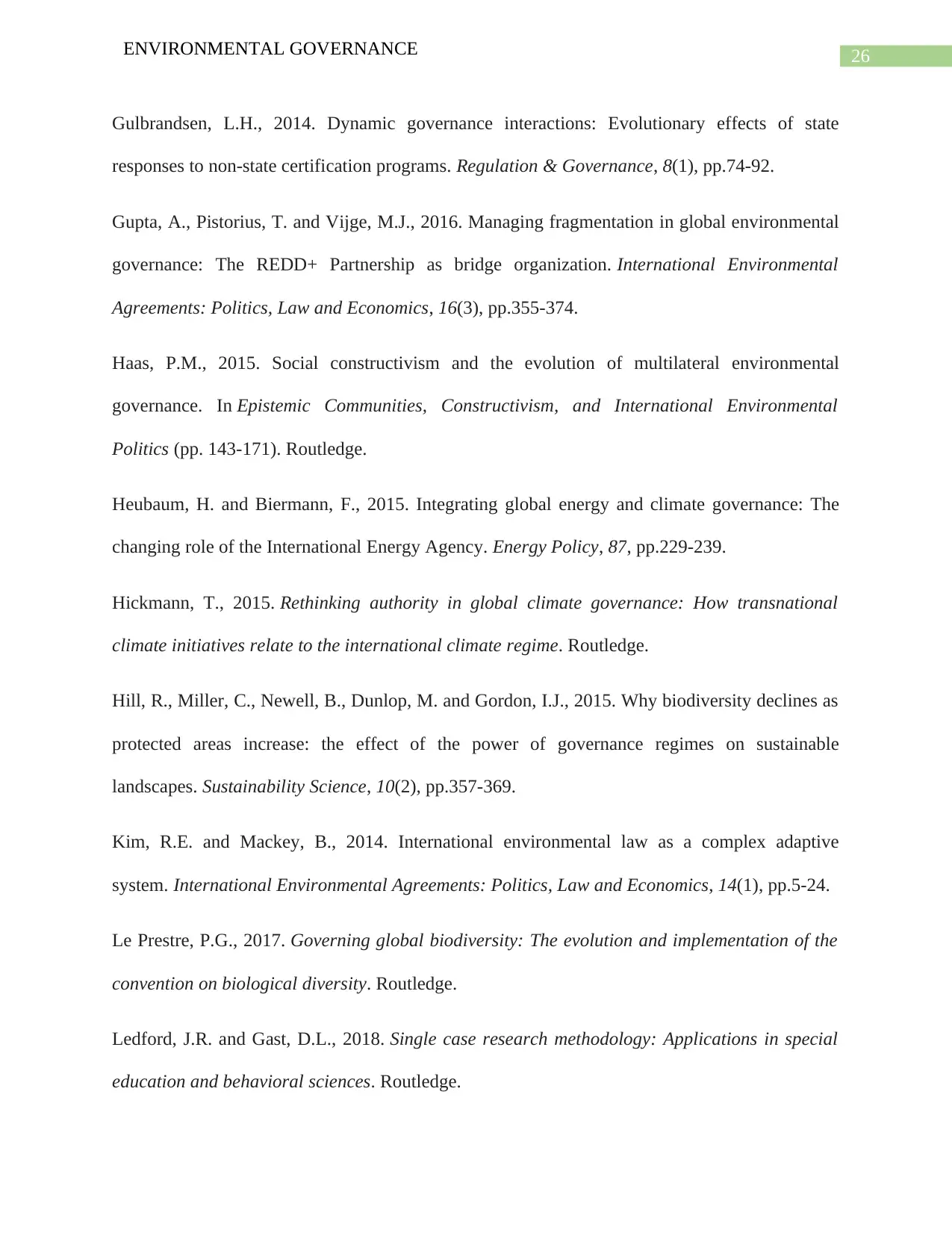
26ENVIRONMENTAL GOVERNANCE
Gulbrandsen, L.H., 2014. Dynamic governance interactions: Evolutionary effects of state
responses to non‐state certification programs. Regulation & Governance, 8(1), pp.74-92.
Gupta, A., Pistorius, T. and Vijge, M.J., 2016. Managing fragmentation in global environmental
governance: The REDD+ Partnership as bridge organization. International Environmental
Agreements: Politics, Law and Economics, 16(3), pp.355-374.
Haas, P.M., 2015. Social constructivism and the evolution of multilateral environmental
governance. In Epistemic Communities, Constructivism, and International Environmental
Politics (pp. 143-171). Routledge.
Heubaum, H. and Biermann, F., 2015. Integrating global energy and climate governance: The
changing role of the International Energy Agency. Energy Policy, 87, pp.229-239.
Hickmann, T., 2015. Rethinking authority in global climate governance: How transnational
climate initiatives relate to the international climate regime. Routledge.
Hill, R., Miller, C., Newell, B., Dunlop, M. and Gordon, I.J., 2015. Why biodiversity declines as
protected areas increase: the effect of the power of governance regimes on sustainable
landscapes. Sustainability Science, 10(2), pp.357-369.
Kim, R.E. and Mackey, B., 2014. International environmental law as a complex adaptive
system. International Environmental Agreements: Politics, Law and Economics, 14(1), pp.5-24.
Le Prestre, P.G., 2017. Governing global biodiversity: The evolution and implementation of the
convention on biological diversity. Routledge.
Ledford, J.R. and Gast, D.L., 2018. Single case research methodology: Applications in special
education and behavioral sciences. Routledge.
Gulbrandsen, L.H., 2014. Dynamic governance interactions: Evolutionary effects of state
responses to non‐state certification programs. Regulation & Governance, 8(1), pp.74-92.
Gupta, A., Pistorius, T. and Vijge, M.J., 2016. Managing fragmentation in global environmental
governance: The REDD+ Partnership as bridge organization. International Environmental
Agreements: Politics, Law and Economics, 16(3), pp.355-374.
Haas, P.M., 2015. Social constructivism and the evolution of multilateral environmental
governance. In Epistemic Communities, Constructivism, and International Environmental
Politics (pp. 143-171). Routledge.
Heubaum, H. and Biermann, F., 2015. Integrating global energy and climate governance: The
changing role of the International Energy Agency. Energy Policy, 87, pp.229-239.
Hickmann, T., 2015. Rethinking authority in global climate governance: How transnational
climate initiatives relate to the international climate regime. Routledge.
Hill, R., Miller, C., Newell, B., Dunlop, M. and Gordon, I.J., 2015. Why biodiversity declines as
protected areas increase: the effect of the power of governance regimes on sustainable
landscapes. Sustainability Science, 10(2), pp.357-369.
Kim, R.E. and Mackey, B., 2014. International environmental law as a complex adaptive
system. International Environmental Agreements: Politics, Law and Economics, 14(1), pp.5-24.
Le Prestre, P.G., 2017. Governing global biodiversity: The evolution and implementation of the
convention on biological diversity. Routledge.
Ledford, J.R. and Gast, D.L., 2018. Single case research methodology: Applications in special
education and behavioral sciences. Routledge.
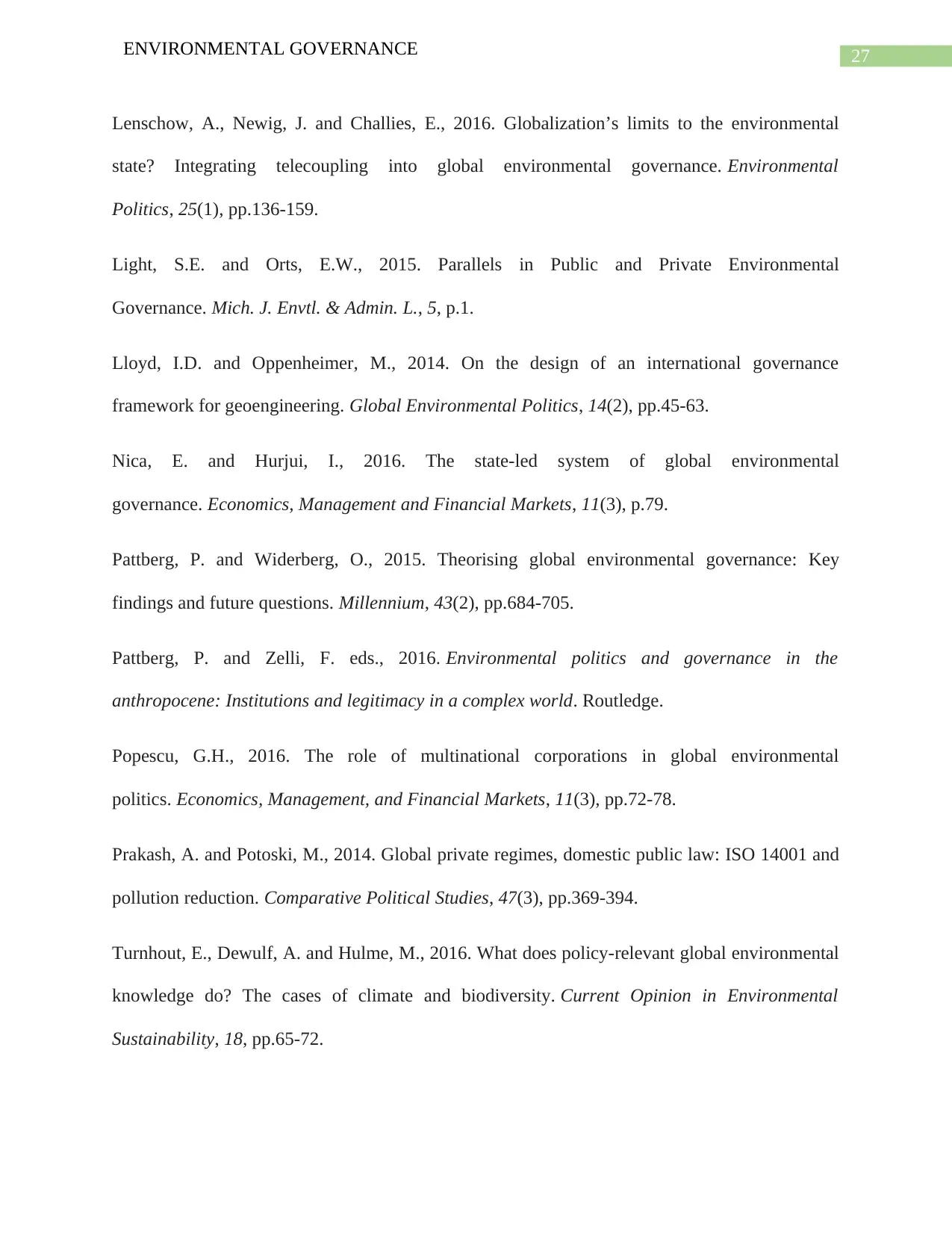
27ENVIRONMENTAL GOVERNANCE
Lenschow, A., Newig, J. and Challies, E., 2016. Globalization’s limits to the environmental
state? Integrating telecoupling into global environmental governance. Environmental
Politics, 25(1), pp.136-159.
Light, S.E. and Orts, E.W., 2015. Parallels in Public and Private Environmental
Governance. Mich. J. Envtl. & Admin. L., 5, p.1.
Lloyd, I.D. and Oppenheimer, M., 2014. On the design of an international governance
framework for geoengineering. Global Environmental Politics, 14(2), pp.45-63.
Nica, E. and Hurjui, I., 2016. The state-led system of global environmental
governance. Economics, Management and Financial Markets, 11(3), p.79.
Pattberg, P. and Widerberg, O., 2015. Theorising global environmental governance: Key
findings and future questions. Millennium, 43(2), pp.684-705.
Pattberg, P. and Zelli, F. eds., 2016. Environmental politics and governance in the
anthropocene: Institutions and legitimacy in a complex world. Routledge.
Popescu, G.H., 2016. The role of multinational corporations in global environmental
politics. Economics, Management, and Financial Markets, 11(3), pp.72-78.
Prakash, A. and Potoski, M., 2014. Global private regimes, domestic public law: ISO 14001 and
pollution reduction. Comparative Political Studies, 47(3), pp.369-394.
Turnhout, E., Dewulf, A. and Hulme, M., 2016. What does policy-relevant global environmental
knowledge do? The cases of climate and biodiversity. Current Opinion in Environmental
Sustainability, 18, pp.65-72.
Lenschow, A., Newig, J. and Challies, E., 2016. Globalization’s limits to the environmental
state? Integrating telecoupling into global environmental governance. Environmental
Politics, 25(1), pp.136-159.
Light, S.E. and Orts, E.W., 2015. Parallels in Public and Private Environmental
Governance. Mich. J. Envtl. & Admin. L., 5, p.1.
Lloyd, I.D. and Oppenheimer, M., 2014. On the design of an international governance
framework for geoengineering. Global Environmental Politics, 14(2), pp.45-63.
Nica, E. and Hurjui, I., 2016. The state-led system of global environmental
governance. Economics, Management and Financial Markets, 11(3), p.79.
Pattberg, P. and Widerberg, O., 2015. Theorising global environmental governance: Key
findings and future questions. Millennium, 43(2), pp.684-705.
Pattberg, P. and Zelli, F. eds., 2016. Environmental politics and governance in the
anthropocene: Institutions and legitimacy in a complex world. Routledge.
Popescu, G.H., 2016. The role of multinational corporations in global environmental
politics. Economics, Management, and Financial Markets, 11(3), pp.72-78.
Prakash, A. and Potoski, M., 2014. Global private regimes, domestic public law: ISO 14001 and
pollution reduction. Comparative Political Studies, 47(3), pp.369-394.
Turnhout, E., Dewulf, A. and Hulme, M., 2016. What does policy-relevant global environmental
knowledge do? The cases of climate and biodiversity. Current Opinion in Environmental
Sustainability, 18, pp.65-72.
Secure Best Marks with AI Grader
Need help grading? Try our AI Grader for instant feedback on your assignments.
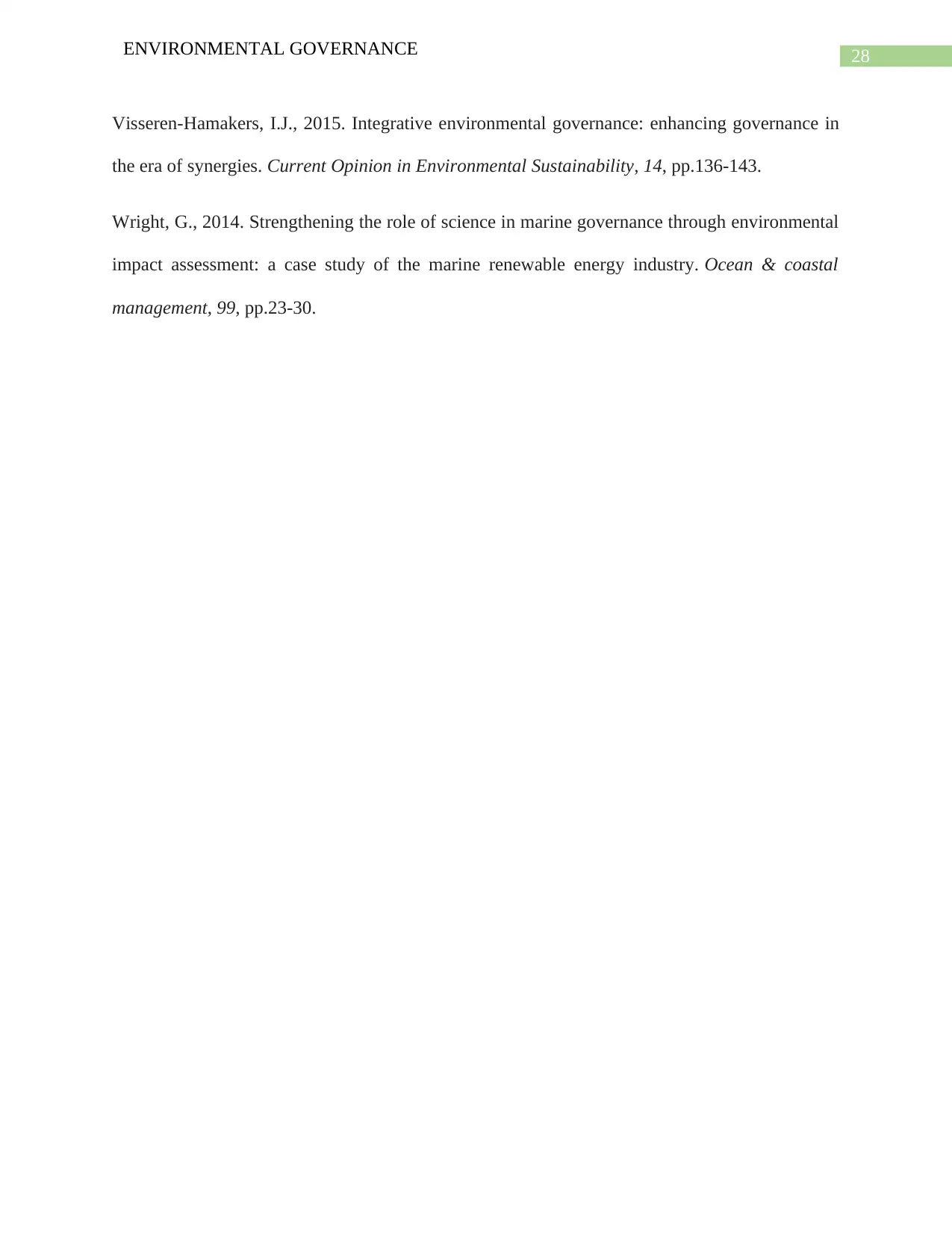
28ENVIRONMENTAL GOVERNANCE
Visseren-Hamakers, I.J., 2015. Integrative environmental governance: enhancing governance in
the era of synergies. Current Opinion in Environmental Sustainability, 14, pp.136-143.
Wright, G., 2014. Strengthening the role of science in marine governance through environmental
impact assessment: a case study of the marine renewable energy industry. Ocean & coastal
management, 99, pp.23-30.
Visseren-Hamakers, I.J., 2015. Integrative environmental governance: enhancing governance in
the era of synergies. Current Opinion in Environmental Sustainability, 14, pp.136-143.
Wright, G., 2014. Strengthening the role of science in marine governance through environmental
impact assessment: a case study of the marine renewable energy industry. Ocean & coastal
management, 99, pp.23-30.
1 out of 29
Related Documents
Your All-in-One AI-Powered Toolkit for Academic Success.
+13062052269
info@desklib.com
Available 24*7 on WhatsApp / Email
![[object Object]](/_next/static/media/star-bottom.7253800d.svg)
Unlock your academic potential
© 2024 | Zucol Services PVT LTD | All rights reserved.




